Begg - transport policy has gone backwards
Former government advisor laments direction of travel over last 20 years and warns that Labour’s policies won’t deliver transformational change
Former government transport advisor Professor David Begg says the UK is lacking a vision for transforming transport in a way that will deliver essential economic, social and environmental outcomes.
Begg chaired the influential Commission for Integrated Transport after it was established by the Labour government in 1999, which had a remit to hold the government to account on transport policy. As polling day approaches, he does not believe that the Labour Party currently has the policies required to achieve a transformation.
Speaking at last week’s
Transport Times conference in London, Transport after the General Election, he said: “I don’t see what they are going to achieve with the policies they have put forward ... If Labour wants two terms, I wouldn’t be able to stand here today and tell you what is going to be radically different about Britain in eight years time with two terms of a Labour government.”
He said Labour was focussed
“I can’t believe how far we’ve gone back in 20 years” Professor David Begg
on “Level 2” issues like public ownership and control and not “Level 1” issues like price signals.
“When was the last time you heard a politician ... stand up and say we need to change travel behaviour? We need to make more responsible use of the car,” he said. “I can’t believe how far we’ve gone back in 20 years. Honestly, I just can’t.”
Begg urged Labour to build HS2 to Crewe and to link fuel duty to inflation - policies that would give public transport a competitive advantage. “They need to spell out the consequences of motoring being on the cheap side,” he said.
CONTINUED ON PAGE 12

FORTEVERYNIGHT
ISSUE 314 31 MAY 2024 NEWS, VIEWS AND ANALYSIS FOR A SECTOR ON THE MOVE
Flurry of open access applications Arriva, FirstGroup and Virgin have plans 06 BYD aiming to make inroads into UK market Chinese bus builder launches e-decker 04 ‘Buses need a timetable for Net Zero’ SMMT calls for an ambitious strategy 14 What will July 4 mean for transport? Norman Baker on the forthcoming election 16 No more tinkering? Chris Cheek on Labour’s bus plans 20 NEWS EXTRA NET ZERO COMMENT CHEEKY CAMPAIGN Bus operator Go North East has launched a marketing campaign - GET YOUR BUM ON BOARDto raise awareness of the great value fares that are currently available for travelling by bus. Full story on pages 18-19 COMMENT NEWS
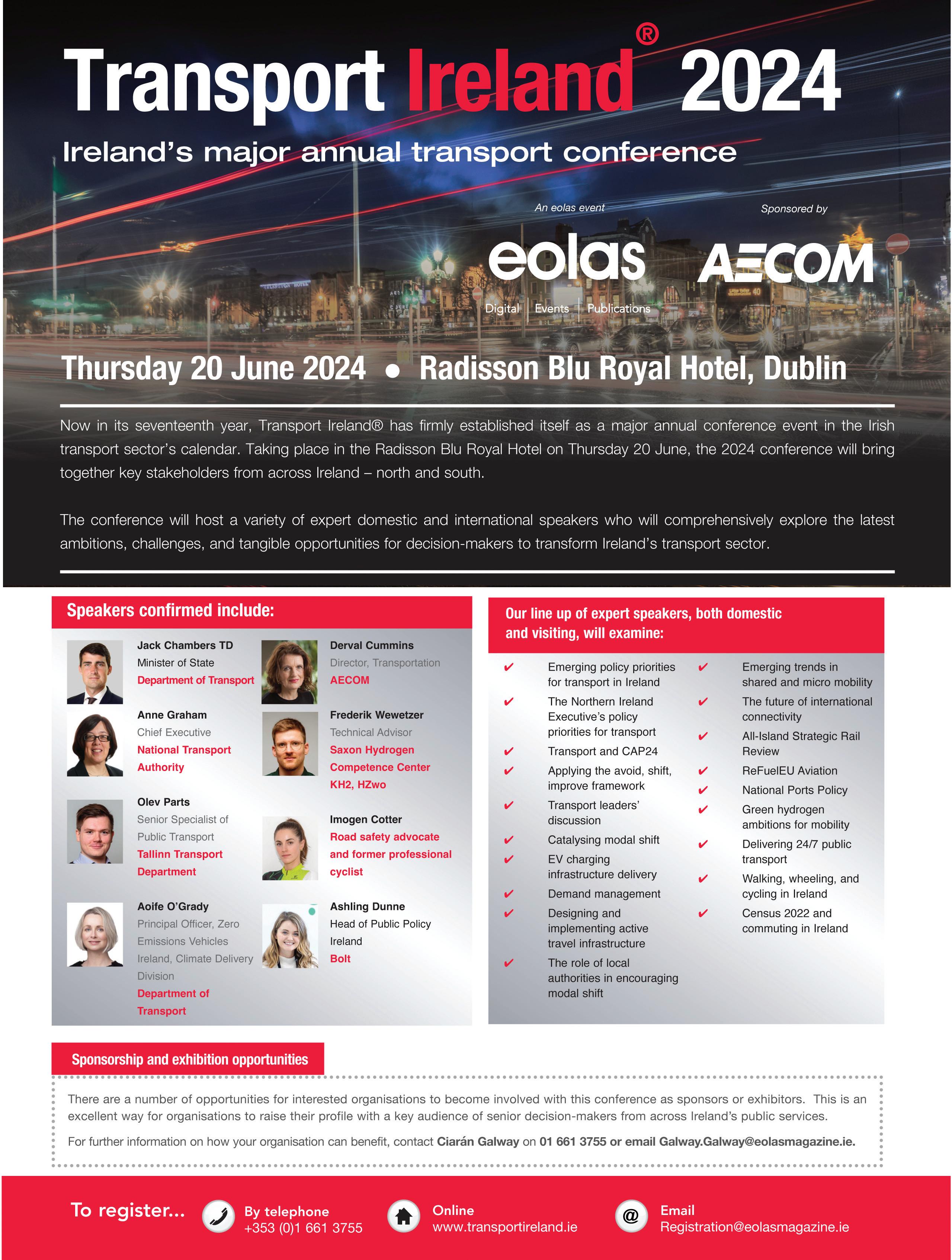
Safety-first Starmer needs a radical vision for transport
 Robert Jack Managing Editor
Robert Jack Managing Editor
I recall attending a Westminster press briefing in 1999 with deputy prime minister John Prescott (who was also secretary of state for the environment, transport and the regions) and Professor David Begg, chair of the new Commission for Integrated Transport. Prescott conceded that he had made a rod for his own back with the establishment of the new body, which was tasked with holding the government to acc0unt on transport policy. At the time it seemed like this was the direction of travel, but the wheels came off. Can you imagine Sir Keir Starmer making a rod for his back if he becomes prime minister? The need to transform transport is arguably greater than ever in an era of stagnant economic growth, dwindling public transport provision and stubbornly high carbon emissions from the transport sector. But there is no radical vision to address these challenges - and no independent adjudicator. As Begg pointed out at a conference in London last week, Labour’s promise of greater public control will please many but it’s not going to shift the dial significantly. Before Labour’s 1997 landslide, Roy Jenkins described Tony Blair as being “like a man carrying a priceless Ming vase across a highly polished floor”. Many think Starmer appears even more cautious as he seeks to become the first Labour leader in my lifetime - aside from Blair - to win a general election. If he succeeds, he will have to make some tough decisions to get transport policy back on track.
IN THIS ISSUE
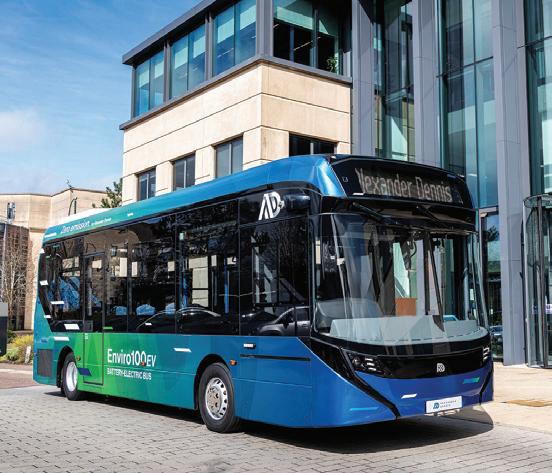
15 ADL JOINS CA MBRI D GE CONNEC TOR PROJEC T
Alexander Dennis has joined the consortium delivering the Greater Cambridge Partnership’s self-driving vehicle project, Connector, for which it will build three Enviro100AEV autonomous buses in partnership with Fusion Processing Ltd.
ORG A NIS ATION PAGE
4-5, 15
9
Go-Ahead Group 8, 9
Go-Ahead London 4-5 Go North East 1 Grand Central 6 Great British Railways 7, 12 Hitachi Rail 14
18 S H A RP THINKING
TO GET BUMS ON BUSES
Alex Warner is impressed with bus operator Go North East’s new campaign to get more people on the bus. “The bus company believes its ‘cheeky’ message is a winning way to raise awareness of low-cost bus travel,” he says.
22
ARE WE RI D ING ON A N E L EC TRI C WAVE?
“A recent ride on one of my local operator’s new electric buses highlighted how the vehicle is only part of a much bigger package,” says Nick Richardson. He adds that the bus is just one part of an overarching product that will get people to switch.
25 DE A R S EC RETA RY OF STATE.. GOO D LU C K!
editorial@passengertransport.co.uk forename.surname@ passengertransport.co.uk
Telephone: 020 3950 8000
Managing
Deputy
Contributing
Directors
OFFICE CONTACT DETAILS Passenger Transport Publishing Ltd
PO Box 5496, Westbury BA13 9BX, UNITED KINGDOM
Telephone (all enquiries): 020 3950 8000
EDITORIAL
editorial@passengertransport.co.uk
ADVERTISING ads@passengertransport.co.uk
SUBSCRIPTIONS
11 HAVE YOUR SAY Contact us with your news, views and opinion at: editorial@passengertransport.co.uk
8
Great Minster Grumbles: Our Whitehall insider imagines what’s going on inside the minds of the mandarins at Great Minster House, home of the DfT. “Will the next secretary of state finally be brave enough to embrace road pricing?”
PASSENGER TRANSPORT
Publisher
Editor &
Robert Jack
Editor Andrew Garnett
Writer Rhodri Clark
Chris Cheek, Andrew Garnett, Robert Jack
subs@passengertransport.co.uk ACCOUNTS accounts@passengertransport.co.uk Passenger Transport is only available by subscription. Subscription rates per year; UK £140 (despatch by Royal Mail post); Worldwide (airmail) £280 The editor welcomes written contributions and photographs, which should be sent to the above address. All rights reserved. No part of this publication may be reproduced in whole or in part without the publisher’s written permission. Printed by Cambrian Printers Ltd, Stephens & George Print Group, Goat Mill Road, Dowlaid, Merthyr Tydfil CF48 3TD © Passenger Transport Publishing Ltd 2024 ISSN 2046-3278 SUBSCRIPTIONS HOTLINE 020 3950 8000 PASSENGER TRANSPORT PO Box 5496, Westbury BA13 9BX 020 3950 8000 editorial@passengertransport.co.uk CONTENTS www.passengertransport.co.uk 31 May 2024 | 03 REGULARS NEWS 04 NET ZERO 14 INNOVATION & TECH 15 COMMENT 16 GRUMBLES 25 CAREERS 26 DIVERSIONS 28
Alexander Dennis
Angel Trains 14 Arriva 6,
Bus Vannin 9 BYD 4-5 Cardiff Bus 11 Carousel Buses 9 Compass Royston 8 Elizabeth Line 12 Esk Valley 8 Eurostar 7 Falcon Buses 8 FirstGroup 6 Fourway Coaches 8 Fusion Processing 15
Pulhams
SMMT
Zenobe
Hull Trains 6 Lancashire County Council 9 Liverpool City Region 7 Lumo 6 Newport Transport 11 Procters Coaches 8
14 Stagecoach Manchester 9 Stagecoach South Wales 11 TransPennine Express 14 Transport for Greater Manchester 10 Transport for Wales 10, 11 Urban Transport Group 10 UK Bus Awards 9 Virgin Group 6
BYD aiming to make inroads into UK market
BYD has launched the ‘viable’ BD11 double decker in a move that will see the Chinese manufacturer launch a full-scale assault on the UK market

Every now and then, a new vehicle will be introduced to the industry that ostensibly is all very hush-hush but, in actual fact, has been an open secret for months. Rumours have swirled around for some time that Chinese manufacturer BYD - an acronym of Build Your Dreamswas poised to go it alone in the UK market. After all, many questioned how much longer its muchvaunted joint venture with British manufacturer Alexander Dennis (ADL) - which has now been in place for almost a decade - could last after ADL announced it would strike out on its own with a new range of electric buses engineered from the ground up (PT300).
And so it was at the London Bus Museum at Brooklands that BYD last week unveiled its all-new BD11 double decker - a 90-passenger 10.9 metre-long bus wholly designed and constructed in-house. It aims to offer operators exceptional range and performance as well as competitive pricing. Media reports ahead of the launch suggest the BD11 will be around 25% cheaper than its UK-manufactured equivalentssomething that will undoubtedly concern - or even terrifymanufacturers’ boardrooms in Ballymena and Larbert.
BYD’s decision to launch the new BD11 double-decker at the London Bus Museum is clearly
a statement of intent. As the manufacturer’s great and good took their turn on the podium to reveal the new product, they stood alongside one of the two prototype BYD K9E buses that entered service with Go-Ahead London in late 2013. That bus is now preserved in the museum as a critical milestone in the history of bus operation in the capital. It is clear that the London market remains crucial to BYD’s aspirations in the short term, but more on that later.
BYD is not a flash in the pan by any means - it is increasingly a global electric vehicle powerhouse. While some sections of the industry scoffed when BYD introduced those two K9Es into trial service in London in 2013 with their ‘shower cubicle’ battery compartments between the front wheel arches, they undoubtedly had an impact and hastened in the era of the mainstream zero-emission bus. By last summer, BYD’s JV with ADL had delivered 1,500 buses; today it is closer to 1,800.
That success is being replicated by BYD around the world. In 2023, the Chinese manufacturer sold over three million ‘new energy vehicles’, a category that includes battery-electric and plugin hybrid vehicles. This marked a staggering year-on-year growth of almost 62%. While cars make up the bulk of BYD’s sales, a closer look at the statistics reveals a remarkable increase of 88.2% in the commercial vehicle segment,
including electric buses and trucks, with 11,511 vehicles.
BYD’s strategic vision extends well beyond China. Since 2017, it has been operating a facility on the banks of the Danube in Komárom, Hungary, producing an increasing number of buses and trucks for continental European markets. The company’s commitment to Europe was further solidified with the announcement of a new car production facility in Szeged, located in the south of Hungary. In recent weeks BYD executives have said they aim to topple VW, Tesla and Stellantis to become the largest battery-electric vehicle seller in Europe by 2030.
Blade Battery technology
Back to the BD11. This is the third generation of BYD’s electric bus platform. The company manufactured over 30,000 units of the first-generation, e-Platform 1.0, bus, followed by more than 50,000 units based on the e-Platform 2.0. That includes those 1,800 buses in service in the UK as part of the JV with ADL. BYD aims to build on this success with the e-Platform 3.0 that underpins the BD11. The manufacturer believes the critical competitive advantage of the new bus lies in its innovative Blade Battery technology.
When the subject of electric vehicles comes up, the discourse inevitably moves on to the toxic materials in many battery chemistries. However, the Blade
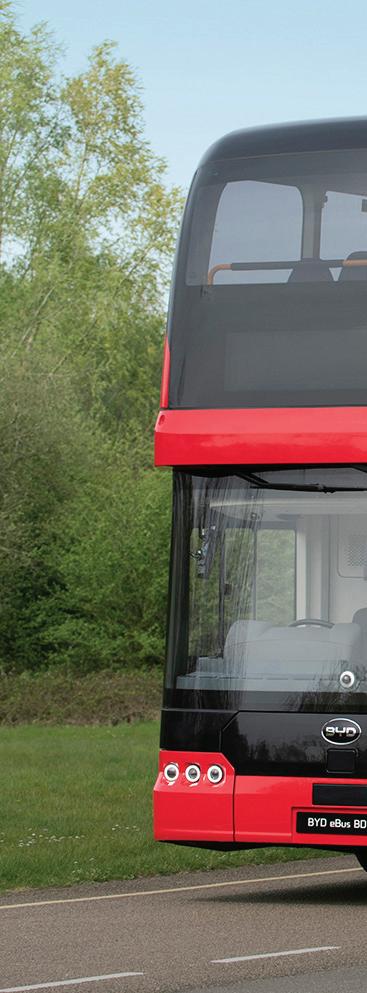
Battery uses what BYD claims is “revolutionary” lithium-ion phosphate chemistry that aims to offer not only improved energy efficiency but also without cobalt and some of the other toxic nasties like nickel and other metals found in other EV battery chemistries. Lithium-ion phosphate also promises greater safety than conventional lithiumion batteries, and BYD stresses that the Blade Battery has been subjected to the Nail Penetration Test, which it passed without emitting fire or smoke. To begin with BYD is offering two battery options - 457 or 532
BYD 04 | 31 May 2024 www.passengertransport.co.uk
Andrew Garnett Deputy Editor
NEWS EXTRA
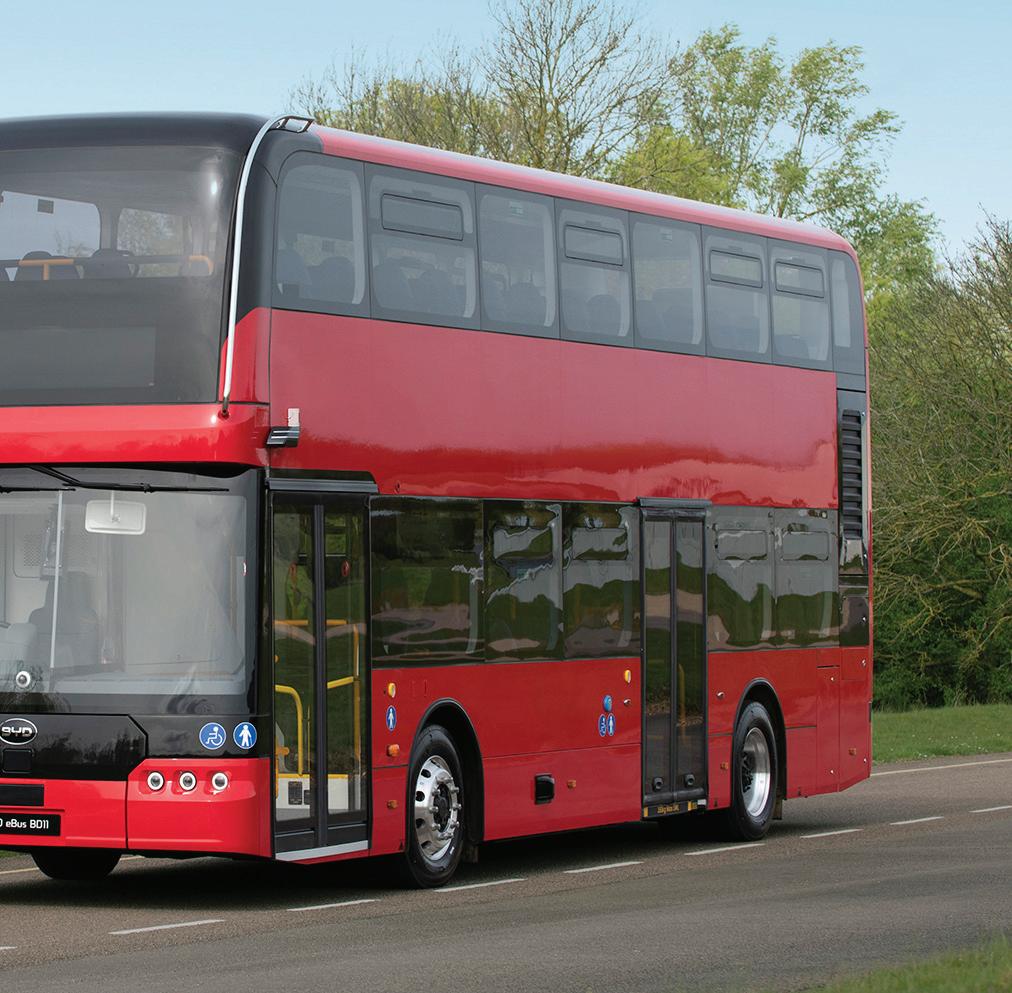
“We are here to deliver value for UK bus operators and the taxpayer. We will never be ashamed of that” Frank Thorpe, BYD UK
kWh - with the usual caveat that this is the initial capacity and will decrease over time and use. Both options come with a 10-year, 80% state-of-health warranty as standard. On broader BD11 bus warranties, BYD remains tightlipped for now.
The batteries in the BD11 are integrated into its chassis, making them part of the vehicle’s structure. BYD claims that this
helps reduce overall weight, which enhances range and reduces energy consumption. Addressing potential concerns about ground clearance, Peter Wu, BYD’s product director, stated at the launch that the design has undergone over 1.5 million tests, examining how the chassis responds to obstacles and flexing. Operators are offered flexibility in charging options, with a
A viable electric bus? BYD is being coy about initial BD11 orders, citing non-disclosure agreements with customers, but media reports ahead of the launch suggest Go-Ahead London has placed a significant order for the type. While London is BYD’s initial focus, it plans to introduce a single-decker bus for the provincial market by the fourth quarter of this year. A single-decker for London will follow in the first quarter of 2025 and a low-height provincial double decker will be launched by mid2025. Going forward BYD also has ambitions to expand its line up into other bus segments. It’s clear that BYD is serious about the UK market and will have a very sharp pencil in future operator procurement competitions.
choice between conventional gun charging or roof-mounted pantographs, the latter providing a maximum charge of 500kW. Dual-gun charging allows for a full recharge in under two hours.
The vehicle features two 150kW hairpin motors in the rear axle, which improve efficiency with a flat wire and oil-free design. This results in a 15% weight reduction and what BYD claims is extremely low motor noise. An integrated thermal management system also helps save energy while the HVAC system is designed to meet the latest Transport for London regulations.
“We’ve been through the trials, and we’ve been through the deployment - we’ve been through the low-hanging fruit if you like - but now the industry needs a viable electric bus for the next stage of deployment,” said Frank Thorpe, managing director of BYD’s commercial vehicle business in the UK. “It needs to be viable technically, commercially and operationally. We need the bus of the future, but we need it today.”
He added that the UK industry was clearly facing challenges, but with the BD11, BYD was giving the UK market a bus “that will go further, for longer, for less.” Thorpe also highlighted BYD’s vertical integration - where it manufactures the battery, controller, and motor as well as the bus - as a key strength.
“We’re competitive as we’re a complete vehicle manufacturer. I am not going to be ashamed of being competitive. We are here to deliver value for UK bus operators and the taxpayer. We will never be ashamed of that.”
London is the first target for BYD’s BD11 batteryelectric double decker
www.passengertransport.co.uk 31 May 2024 | 05
FirstGroup wants to launch London to Rochdale services via Manchester from 2027

Flurry of applications for open access services
FirstGroup and Virgin announce plans for new routes on the West Coast Main Line as Arriva plots expansion of existing Grand Central services
OPEN ACCESS
Arriva, FirstGroup, and Virgin have all confirmed they have applied to the Office of Rail and Road for paths to introduce new open access rail services.
FirstGroup and Virgin are both focused on new services on the West Coast Main Line, while Arriva plans to expand its existing Grand Central operations between London, Yorkshire, and the North East of England. FirstGroup, encouraged by the financial success of its Hull Trains and Lumo open-access operations, is planning a new Lumo-branded service between London and Rochdale, potentially starting in 2027. The company proposes operating six return services a day from London Euston to Rochdale, with stops at Warrington Bank Quay on the West Coast Main Line (WCML),
Newton-le-Willows, Eccles, and Manchester Victoria.
This service would provide a direct connection between Rochdale and London for the first time since 2000. FirstGroup states that the proposed openaccess service would also facilitate easier access via Eccles and interchange with the Manchester Metrolink light rail network to the city of Salford. As the line between Manchester Victoria and Rochdale is not electrified, FirstGroup plans to order new UK-built rolling stock that would use battery power on this section of the route.
“We have seen the level of
growth and opportunity that is possible with open access, as well as the positive effect it has on the wider market, including economic and environmental benefits,” said FirstGroup chief executive Graham Sutherland.
“In addition, the new service will help to drive modal shift from road to rail between the North West and London.”
Earlier this year, FirstGroup announced plans to expand Lumo open access services with a new route between London King’s Cross and Sheffield via the East Coast Main Line and an additional daily return journey between London and Newcastle
“We have seen the level of growth and opportunity that is possible with open access” Graham Sutherland, FirstGroup
on its existing service between London and Edinburgh.
Meanwhile, Virgin Group has applied to operate four open-access services on the WCML, running from London Euston to Birmingham New Street, Liverpool Lime Street, Manchester, and Glasgow Central. It proposes that the Manchester service would continue to either Rochdale via Manchester Victoria or Preston via Bolton, Horwich, and Chorley.
Josh Bayliss, chief executive of the Virgin Group, stated that Virgin believes “open access is the way forward” as it enhances consumer choice and competition, both of which Virgin says it has always supported.
Separately, Arriva has applied to run two additional daily return services between Bradford and London King’s Cross, with up to eight intermediate station stops. This would increase the daily total of trains on the route to six.
The group is also proposing a new early morning service service between York and London King’s Cross, with a return journey in the late evening. Additionally, the company plans to add four new daily stops on its Sunderland route at Seaham in County Durham, providing the town with direct trains to London for the first time.
“These proposals would bring more services and choice to passengers, building on the success of Grand Central’s open access operations, which connect a number of under-served communities in both the North East and West Yorkshire to London,” said Arriva UK Trains managing director David Brown. “This is a growth opportunity for the railway and a positive development for passengers and for our colleagues at Grand Central.”
NEWS ROUND-UP 06 | 31 May 2024 www.passengertransport.co.uk
DfT has achieved ‘very little’ on rail reform
Minimal progress has been made, says Public Accounts Committee
RAIL REFORM
According to a new report by the cross-party parliamentary Public Accounts Committee (PAC), the Department for Transport has made minimal progress in implementing rail reform, leaving Great British Railways’ (GBR) responsibilities unclear and costing taxpayers.
The report criticises the DfT for its lack of urgency and progress in the six years since it identified the need for rail reform. The PAC states it has “yet to see convincing evidence that this reform programme will turn out to be any different” from previous rail reviews over the last 20 years.
The PAC has urgently called on the DfT to outline a clear plan for “how and by when it will successfully deliver the
reforms that are urgently needed in the rail sector” as soon as possible in the new parliament. This is contingent on the next government’s commitment to rail reform, which seems likely because both major parties have similar plans to create an integrated rail body,.
Despite six years of effort, the PAC contends that the DfT “has failed to resolve the fundamental disagreements and clarify key aspects of reform”. Disagreements persist with HM Treasury and other stakeholders in some important areas, with unresolved issues about GBR’s role, responsibilities, independence, and ability to be a “guiding mind” for the railways. The PAC calls on the DfT to “urgently resolve disagreements ahead of taking forward reform in the next parliament”.
The PAC also highlights the DfT’s lack of engagement with
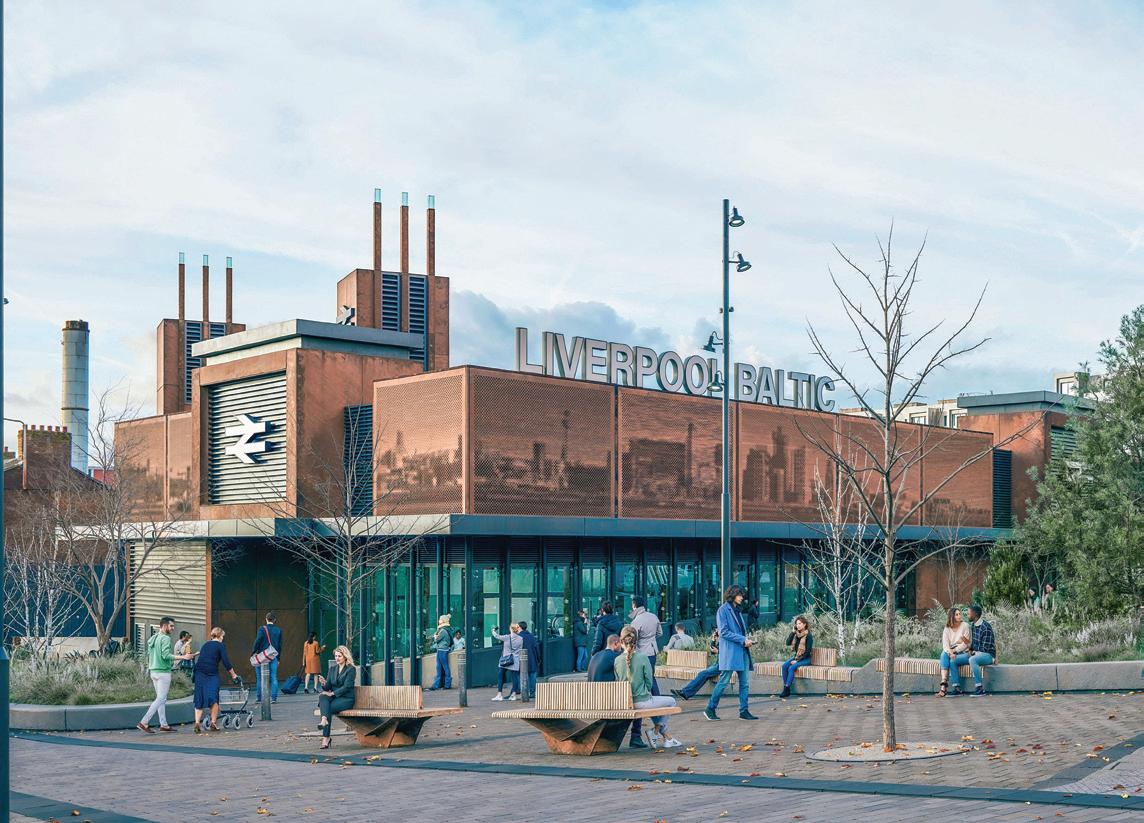
the rail workforce regarding planned reforms. The report states that this absence of engagement risks a lack of understanding of the challenges faced by staff responsible for implementing the reforms but also undermines the potential for successful implementation. The PAC recommends that the DfT “meaningfully engage” with the workforce to ensure successful implementation.
The PAC believes the DfT’s efforts must focus sufficiently on passengers and taxpayers. Performance issues persist, with 13.7% of trains delayed and 3.8% cancelled in 2022-23. It claims taxpayers are also subsidising passenger rail services at an unsustainable level (£3.1bn in 2022-23), and the PAC is “disappointed” that the DfT only began focusing on efficiency savings during the pandemic.
“While the Department is fully
BOARD BACKS NEW HIGH SPEED LINE
Liverpool-Manchester
Railway Board established
CONNECTIVITY
A new Liverpool-Manchester Railway Board has been established to maximise the benefits of a highspeed railway between the Liverpool City Region and Greater Manchester. Backed by metro mayors Steve Rotheram and Andy Burnham, the board seeks “transformational” investments in Liverpool stations and a new underground station at Manchester Piccadilly. The planned line will also connect Warrington and Manchester Airport.
aware of what is important to passengers, it has not delivered on the basic things that mattered the most,” the report states. The current setup needs to create the right incentives to achieve the best value for money for taxpayers, as revenue goes directly to HM Treasury while the DfT and train operating companies manage costs.
The PAC recommends that the DfT produce a passenger-focused plan outlining clear expectations for train travel post-reform, including targets for train operators. Additionally, the DfT should work with HM Treasury to “resolve the disincentives in the system” to reduce the government subsidy on passenger services to a sustainable level and improve value for money for taxpayers.
The PAC is also dissatisfied with the rail network’s persistent inaccessibility and urges the DfT to improve access for all.
“The Department is planning improvement work that does not require legislation,” the PAC says. “But we have not seen any real sense of urgency in what it is trying to do.”
EUROSTAR PLANS NEW UK ROUTES
New services mooted as a result of growing demand
INTERNATIONAL
Eurostar plans to purchase up to 50 new train according to CEO Gwendoline Cazenave, these new trains will replace older rolling stock and increase the fleet size by a third, from 51 to 67 trains. In an interview with the Financial Times, Cazenave claimed that Eurostar is “definitely” considering opening new routes from London. “With a new fleet, we will study new routes. I think by the end of the year or early 2025, we will be able to say more,” she added.
www.passengertransport.co.uk 31 May 2024 | 07
A NEW STATION FOR LIVERPOOL New images have been released of the planned Liverpool Baltic station. The £100m station is one of four planned by recently re-elected Liverpool City Region mayor Steve Rotheram.
Go-Ahead grows with Yorkshire acquisition
ACQUISITIONS
Go-Ahead has expanded its presence in the coach market by acquiring four regional coach companies in Yorkshire. The move follows last year’s unexpected purchase of the Cotswold-based coach operator Pulhams.
Purchase of three coach operations follows Pulhams buy operation.
The latest acquisitions include Procters Coaches in North Yorkshire, Compass Royston serving Stockton, Middlesbrough, and Teesside, Esk Valley operating in North and East Riding of Yorkshire, and Fourway Coaches in West Yorkshire. This purchase adds 200 employees and a fleet of 140 vehicles across five depots to Go-Ahead’s portfolio, significantly strengthening its foothold in the region and complementing its existing Hull-based East Yorkshire Buses
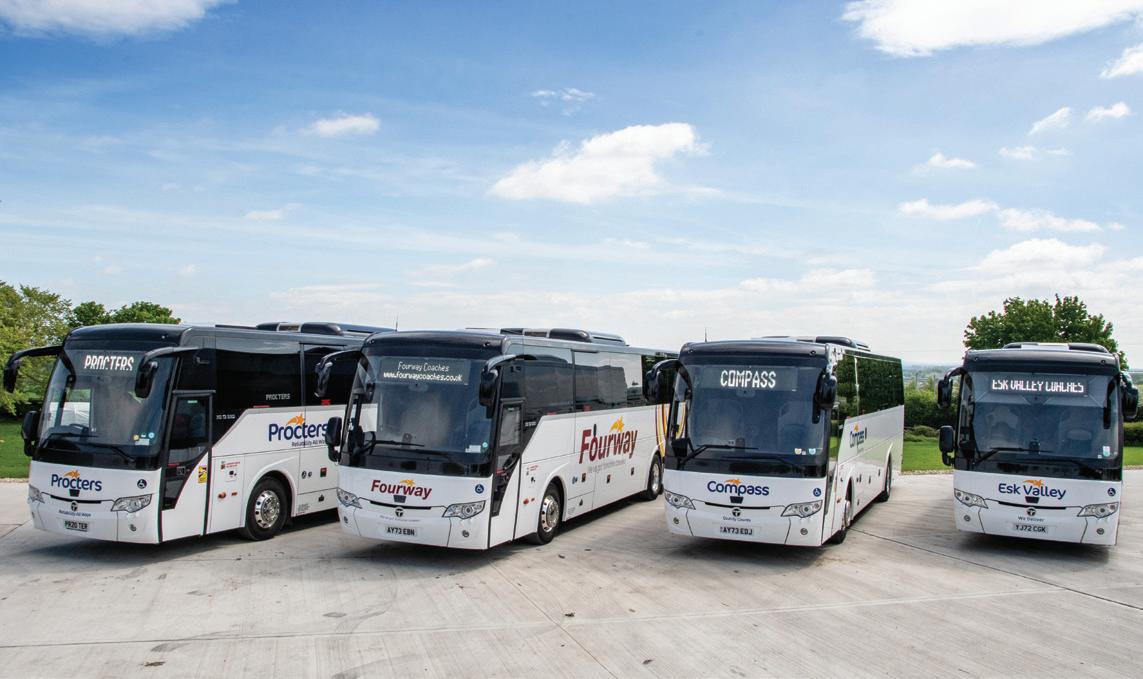
Purchase adds 140 vehicles
customers, our team, and our communities, while maintaining our position as trusted industry leaders.”
The newly acquired businesses will become part of East Yorkshire Buses. Ben Gilligan, managing director of East Yorkshire, said: “We are excited to welcome these reputable companies into the Go-Ahead family. This acquisition represents a milestone in our growth journey, allowing us to expand our operations across a broader geography in Yorkshire.”
“These established and successful companies collectively bring to Go-Ahead a wealth of experience and a diverse range of services, including tendered local bus routes, home-to-school transport, private hire, and commercial contracts,” said the group. East Yorkshire Buses has expanded its geographical footprint in recent years with several significant contracts,
including JustGo North Lincs in 2020 and, more recently, the North Riding services in North Yorkshire.
Matt Carney, chief executive of Go-Ahead’s bus division, commented: “This acquisition aligns seamlessly with GoAhead’s overarching mission to provide reliable, accessible, and sustainable transport solutions. We are committed to upholding our values of caring for our
Kevin Procter, who founded Procters Coaches in 1990, reflected on the sale: “I am proud of everything we’ve achieved in the past 30 years. I turned my father’s taxi company into Procters Coaches, starting with one minibus and one large coach. We have been on a journey of growth and innovation, and we are excited to hand over to the trusted Go-Ahead Group. We are fully supportive of Go-Ahead’s commitment to our team and their approach to driving positive change in the UK coach market, for local communities, customers, and the region.”
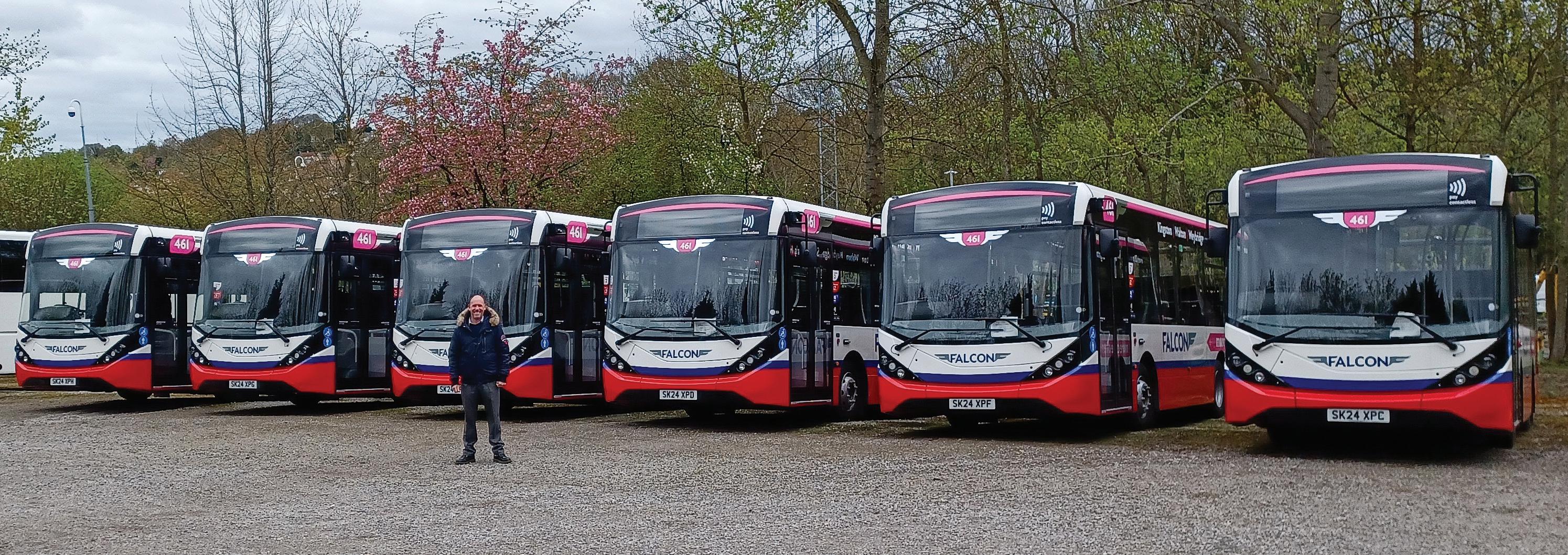
NEWS ROUND-UP 08 | 31 May 2024 www.passengertransport.co.uk
FALCON ROUTE SOARS WITH NEW FLEET Alexander Dennis and Dawsongroup have supplied six new ADL Enviro200 midibuses to Byfleet-based operator Falcon Buses for its Route 461 service linking Kingston, Walton-on-Thames, Weybridge, Addlestone and St Peter’s Hospital. The acquisitions join 47 Enviro200s that make up Falcon’s local bus fleet and take the operator’s average fleet age to just three years. Pictured with the new fleet is Falcon MD Richard Telling.
Isle of Man probes the future of bus operation
State-owned Bus Vannin operation faces major overhaul
CONSULTATION
The Isle of Man Government has launched a major consultation on the future of state-owned bus operator Bus Vannin, amid what it describes as a “financially challenging time for government.”
Currently, farebox revenue covers 48% of the island’s bus network operating costs, with the remaining 52% provided by a £5.8m annual subsidy - or ‘subvention’ - from the Manx government. Including capital expenditure on vehicles and infrastructure, this subsidy rises to approximately £8m per year.
Recent capital investments have made the bus operation one of the most modern in the British Isles and the Manx government believes continued sustained investment is necessary. However, it added that given
LANCS LAUNCHES
£1 SUNDAY FARES
BSIP funding sees new fare promotion introduced
FARES
Lancashire County Council has reduced all adult bus fares on most bus services in the county to £1 on Sundays in a move funded by Lancashire’s Bus Service Improvement Plan.
The move is an extension of the £1 evening fare launched in early 2023 following the Covid-19 pandemic and replaces the existing ‘Buy Saturday, Get Sunday Free’ offer, also known as the Weekender Ticket. This offered
current financial pressures, it is appropriate to review service provision periodically.
It acknowledged that “all routes and services are not equal,” with some being profitable while most require subsidies. In addition to core bus operations, recent years have seen Bus Vannin involved in patient and social care transport, school services, private hire and transfers for visiting cruise ships.
“This is the start of that review process leading to a new bus strategy and operating model,” it stated. “The Department of Infrastructure is developing a transport strategy, and the bus strategy is a daughter document to that. In short, this consultation is part of the process of determining what Bus Vannin will deliver.”
The review could grant Bus Vannin greater autonomy by separating delivery from policy, allowing the bus operator to manage profitable elements of its operation independently, with the
passengers who were buying a day ticket on Saturdays free travel on Sundays as well.
“By extending the £1 fare to also cover Sundays we’re making it cheaper and more convenient than ever to explore all the great things Lancashire has to offer this summer, while travelling sustainably,” said Scott Smith, Lancashire County Council lead member for highways and active travel.
“This significant investment builds upon the enhancements to services we’ve already introduced thanks to the funding received from the Department for Transport in support of our Bus Service Improvement
government only intervening to secure socially necessary services.
“The advantage of this overall approach is that it will give visibility to where the subvention is spent and allow transparent decision-making on that spending,” said the government.
“It will, however, take time to transition to the model as the financial and operational data required to do this is not yet readily available.”
Given the island’s funding environment, the government admitted that costs must be cut.
“By starting to change its focus back to its core business and delivering a service as efficiently as it can, costs can be contained,” it said. “They cannot be contained if Bus Vannin is asked to deliver an ever wider and more diverse range of services. The department will seek to work with partners in the public and private sectors to deliver services where appropriate.”
Plan, which is making buses more frequent, reliable and easier to use.
The promotion’s launch has been made possible due to a £7m package of improvements recently agreed by the council’s cabinet. Other improvements include route enhancements and reopening the information office at Preston bus station, which closed five years ago following spending cuts.
Later this year, Lancashire plans to expand its BSIP-funded fare offers to give young people cheaper bus travel. Those aged between 16 and 21 will be eligible for a third off adult single and return fares, plus day tickets bought from the driver.
CAROUSEL TEMPTS WITH £4K BONUS
Staff recruitment drive follows Arriva withdrawal
RECRUITMENT
Go-Ahead subsidiary Carousel Buses has announced a recruitment event aimed at attracting drivers, mechanics, and supervisory staff, as it prepares to take on much of Arriva’s operations in High Wycombe and Aylesbury. The operator is offering a £4,000 signing bonus for drivers with PCV licences.
The recruitment event, designed to fast-track applications, will be held next week. Attendees will have the opportunity to learn about the company, explore available roles and meet staff. Suitable candidates can undergo on-the-spot interviews.
“We appreciate a lot of staff at Arriva will be impacted by this sad news and we’d like to provide reassurance that there are opportunities available,” said Luke Marion, Carousel Buses’ managing director. “Carousel Buses is a great and rewarding place to work and we offer an excellent package.”
IN BRIEF
BUS DRIVERS WANTED
Stagecoach Manchester has announced it is seeking to recruit 100 bus drivers to work at its Oldham depot following the launch of the second phase of the franchised Bee Network in March.
UK BUS AWARDS LAUNCH
The 2024 UK Bus Awards scheme has launched. Entries are now being sought in 20 categories and are due to close in August to allow judging to commence. The presentation ceremony will be held at Troxy, London on November 26. For more visit ukbusawards.org.uk.
www.passengertransport.co.uk 31 May 2024 | 09
TfW plans support for SMEs with franchising
Some Welsh SME managers are despondent about their prospects of remaining in the bus market from 2026, when bus franchising is rolled out
FRANCHISING
Transport for Wales is preparing to provide centralised support for small and medium-sized enterprises (SMEs) when Wales adopts nationwide bus franchising. The Welsh Government and TfW have also reiterated their desire for smaller operators to play a role in the franchised network, but an officer from Transport for Greater Manchester recently told a Senedd committee that TfGM was not allowed to apply different rules of engagement to help SMEs participate in franchising.
TfW’s board has received a presentation on TfW’s planned approach to franchising “safety, security, sustainability and risk”. The slides from the presentation, published under Freedom of Information Act, explain: “Centralised resources will be utilised for assurance monitoring, SME support and reporting.”
It also refers to potential “in house” or “OLR” bus operation by TfW. There was strong support for a bus Operator of Last Resort when the Welsh Government consulted on franchising, but there is no reference to the OLR in the government’s recent roadmap to bus reform.
Wales has a larger proportion of independent bus operators than England. Some Welsh SME managers are despondent about their prospects of remaining in the bus market from 2026, when bus franchising will start to be rolled out across Wales. Their concerns deepened last winter
when larger operators, including First Cymru, Stagecoach and Newport Transport gained new contracts at the expense of family-owned companies as local authorities implemented the new Bus Network Grant.
The future of SME operators was discussed at a session of the Senedd’s Climate Change, Environment and Infrastructure Committee, which is scrutinising the roadmap to bus reform.
Robbie Thomas, the Welsh Government’s head of bus legislation, said: “We certainly want to work with the industry to make sure that we have got a contractual model that is
attractive to SME operators and is easy for them to work with.”
Lee Robinson, TfW’s executive director for regional transport and integration, said TfW was starting to engage with operators in developing the procurement process. He said the Procurement Act 2023, which comes into force in October, legally requires TfW to “make sure we don’t create barriers for SMEs”.
TfGM director of bus Stephen Rhodes told the committee there had been “very few SME successful bidders so far” for Greater Manchester’s franchise contracts. This was despite TfGM having ensured that each tranche
“We certainly want to make sure that we have got a contractual model that is attractive to SME operators”
Robbie Thomas, Welsh Government
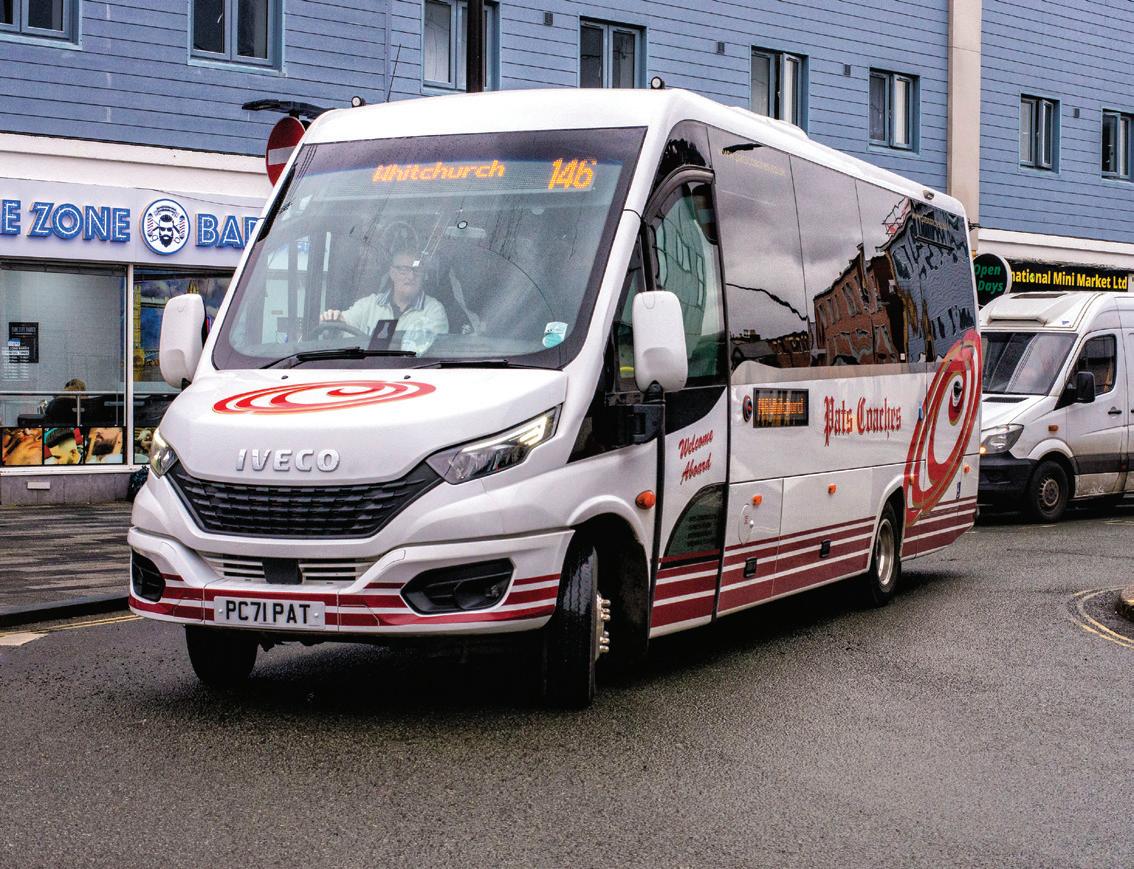
included a range of contracts, in terms of vehicle numbers, that was similar to the pre-existing operations.
“I think our view is that the assumption generally is that some of those smaller operators thought it was going to be little more than what’s happened previously in tendered contracts, whereas in reality, whether we like it or not, and particularly within the rules of a procurement exercise, it was a single procurement exercise,” said Rhodes. “We weren’t trying to have different rules of engagement for smaller operators - we weren’t allowed to.”
He said TfGM had to ensure consistent standards. Social value and the “Greater Manchester good employment charter” were hugely important. “Why wouldn’t that apply for a smaller operator? And that’s a view that’s held passionately by the leaders, by the mayor, and we need to work towards it in a consistent manner, because ultimately not only people out there in the service they get but members of staff – why would they be treated differently potentially in a smaller operator?
“So we’ve not been able to, for example, disapply large parts of the franchising approach to make it easier, and we wouldn’t have been allowed to do that within the way that our procurement was structured.”
Jason Prince, director of the Urban Transport Group, said large organisations could use their skills from overseas to understand how to bid for English franchise contracts. “I think, from what I understand from the proposition in the road map for Wales, it’s not as onerous as the five case model etc, so there’s clearly a level that will be supporting and helping some of the SMEs to actually be able to have the skills to look to enter the market.”
The Welsh Government and TfW want a franchising model which is attractive to SMEs, such as Pat’s Coaches of Wrexham
10 | 31 May 2024 www.passengertransport.co.uk NEWS ROUND-UP
Stagecoach buys diesel in absence of support
Welsh Government is not willing to help fund electric vehicles
VEHICLES
Stagecoach South Wales has introduced nine new diesel Solos to routes in Cwmbran, to replace ageing Solos. The operator would have liked to place electric buses in service instead, but the Welsh Government is not willing to help fund electric vehicles (EVs) on routes other than TrawsCymru until it gains control of the Welsh bus network through franchising.
The nine new slimline Solos were delivered from Switch Mobility, which restarted its production line for diesel Solos last year to fulfil an order for 60 vehicles from Stagecoach. Almost one in three of these is for South Wales, where a second tranche of 10 vehicles is due to enter service in September.
Investment in new buses for Wales dropped off after the Welsh Government first proposed franchising in 2017. The main exceptions were the TrawsCymru network, which the government funds through Transport for Wales, and Cardiff Bus and Newport Transport, where UK Government funding kickstarted acquisition of EVs. Arriva introduced new diesel buses on a North Wales route last year.
Stagecoach South Wales’ new Solos feature e-leather seats and modern audio-visual next-stop technology and meet Euro VI emissions standards. Managing director Martin Gibbon told Passenger Transport: “2017 was the last time Stagecoach South Wales had any investment in
new vehicles for the commercial network.” Stagecoach operates some of the tendered TrawsCymru services.
Explaining why Stagecoach South Wales was buying new diesel vehicles, Gibbon said: “We couldn’t leave Euro III and Euro IV vehicles out there any longer.” Nitrogen Oxide emissions from the new buses are 70% lower than from the vehicles they are ousting. Electric Solos would have cost almost twice as much, and there is no Welsh Government funding available to help bridge the cost gap. “The routes in Cwmbran, Caerphilly and lots of Valleys towns lend themselves to EVs, given the low mileage,” he said.
Gibbon is also chair of CPT Cymru’s bus commission.
“For us to decarbonise, it would cost almost £85m for the vehicles - without the infrastructure”
Martin Gibbon
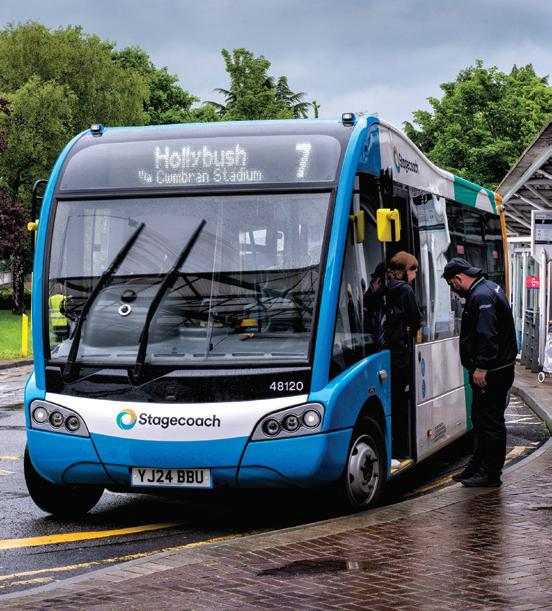
Speaking of the industry as a whole, he said: “We want to decarbonise before franchising. We shouldn’t wait, but we’re still in a depressed recovery.”
Concessionary passenger numbers were still 60% lower than before Covid-19, and farepayers 70% lower, he said. “For us [Stagecoach South Wales] to decarbonise, it would cost almost £85m for the vehicles - without the infrastructure. That’s an example of the hill that we need to climb.”
The Welsh Government’s targets are to make the entire TrawsCymru fleet zero emission by 2026, followed by replacement of half of the most polluting buses by 2028, and the rest by 2035. However, the TrawsCymru EVs will deliver little improvement to urban air quality because most of their mileage is in open countryside.
Gibbon also commented: “We’re really pleased to introduce these buses, considering the challenges we’ve had since the pandemic.”
As Wales emerged from pandemic restrictions, Stagecoach South Wales deregistered many services, primarily because of driver shortages. Last week, Rosa Williams, head of marketing at Stagecoach South Wales, said the company was now in a far better position, with improved driver retention. The shift patterns available are more varied than before the pandemic, and interviewees seeking part-time work are asked what kind of hours they would like. The company also has three female driver trainers, which is helping to attract more women drivers.
ZENOBE SECURES £410M FOR E-BUS ROLL-OUT
Financing will deliver 2,000 buses by 2026
ZERO EMISSION BUSES
Zenobe has secured a further £410m in financing to speed up its support for the roll- out of electric buses across the UK. The announcement, in addition to its existing £241m pioneering financing platform established in 2022, marks over £1bn of green debt funding raised by Zenobe since 2019.
The substantial financing promises to reshape the UK’s urban mobility landscape, offering tailored financial solutions to support bus operators to deliver more than 2,000 new electric buses throughout the UK and Ireland by 2026.
One solution is Zenobe’s battery management service that removes battery risk for operators by taking on the responsibility and risk associated with EV batteries, including battery performance, replacement and repurposing in second-life applications - an area which Zenobe is pioneering.
Steven Meersman, founder and director, Zenobe said: “This is more than a story of Zenobe’s growth; it is a leap forward for the bus industry in the UK. This expansion of our existing financing will help us continue our work with operators across the UK with specialist solutions to one of the biggest barriers to electric fleetsthe upfront cost.
“By gaining both new and renewed support from the right financial partners we are taking another step forward in our mission to electrify the UK’s buses at scale, reducing carbon emissions and connecting more communities in the UK.”
Zenobe has assembled a network of 13 lenders committed to supporting the expansion of green public transport.
One of Wales’ latest diesel buses, at Cwmbran bus station
www.passengertransport.co.uk 31 May 2024 | 11
Transport appraisal is ‘bit of a load of bollocks’
Conference hears criticism of transport project assessment
APPRAISAL
The way that transport projects are currently appraised in the UK came in for criticism at last week’s Transport Times conference in London, Transport after the General Election, with speakers suggesting that a more holistic view is needed.
Commenting on the decision to scrap HS2 north of Birmingham, former government transport advisor Professor David Begg said that it was short-sighted not to include the benefits of freed-up paths on the West Coast Main Line in the appraisal of the project. It was also wrong to omit the uplift in development that would take place around HS2 stations
“It’s bonkers isn’t it,” he said. “It makes absolutely no sense.”
Baroness Randerson, transport spokesperson for the Liberal Democrats said that the way in
TRANSPORT HAS GONE BACKWARDS
Continued from Page 1
Begg pointed out that it was a Tory chancellor, Ken Clarke, who introduced the fuel duty escalator in the 1990s. He said the policy had been introduced in order to change travel behaviour rather than simply to raise money. He said: “The truth of the matter is what we do on roads has a huge impact on rail ... So when you’ve got a fuel duty escalator and you are not building more roads, and the roads are getting
which projects are appraised is “incredibly narrow”.
“The whole picture is not measured,” she told delegates. “Name me a transport project recently, a rail project recently that hasn’t wildly exceeded its expectations and its predictions. They all wildly exceed what is expected of them.”
Randerson pointed to Greater London’s Elizabeth Line and Scotland’s Borders Railway as examples of this phenomenon.
Lee Waters, a Welsh Labour and Co-operative politician
“The people who do the appraisal have started off in their head with what they want the solution to be”
Lee Waters
more congested, guess what, trains have got a competitive advantage. Right now trains have got the very opposite of a competitive advantage, pricewise, because motoring is cheap.”
He added: “The best thing you could do to get a shift to electric vehicles is to make petrol and diesel cars more expensive right throughout the country. In fact, if I was chancellor the first thing I would do is to say that fuel duty automatically increases with inflation - it’s built in.”
Assuming that the outcome of the general election is a Labour government, Begg advised the
who served as the Welsh Government’s deputy minister for climate change from 2021 to 2024, added: “Appraisal, frankly, in my view, controversial, is a bit of a load of bollocks. Because in most examples the people who do the appraisal have started off in their head with what they want the solution to be and they work backwards.
“There are all sorts of formulae designed to try and justify that and to make it look like it’s a sound economic investment.”
He offered the Treasury’s formulaes for monetised journey times savings, often used to justify spending on new roads, as an example, describing it as “a complete fantasy and nonsense and one of the biggest structural problems we have in the system”.
He added: “Instead of assessing appraisal I think we should be doing far more on monitoring evaluation and using that data to help us make future decisions.”
transport sector to make the economic case for investment.
“Those of us who want to influence Labour to be more ambitious on transport have got to dust down all the reports and do new research on how transport is critical to the economy,” he said.
“Is it just a coincidence that the towns and cities in the UK that are least dependent on the
‘LET GREAT BRITISH RAILWAYS GET ON WITH ITS JOB’
Dyan Perry says body should be given freedom
RAIL POLICY
The next government should give Greater British Railways the freedom to get on with its job. That was the plea from Dyan Perry, chair of the High Speed Rail Group, at last week’s Transport Times conference in London, Transport after the General Election.
She told delegates: “Trust it. Don’t interfere. Have an adequate assurance mechanism in place. Be an intelligent client. Don’t person-mark GBR.
“Companies perform a lot better when you are just left to get on with it. Otherwise things get done by committee.”
Perry also urged the next government to engage with the investment community.
“Private sector isn’t bad,” she said. “Private sector finance is going to be essential in the future for us to be able to generate the capacity and connectivity that we need.”
car, where there is less modal share for the car, also happen to be the most prosperous? Is that a coincidence? London? Edinburgh? Brighton? Cambridge? Oxford? Manchester is getting there.
“You can’t run a successful economy on high car mode share, unless you are like Los Angeles and you want to devote 80% of land use to moving vehicles.”
“If I was chancellor the first thing I would do is to say that fuel duty automatically increases with inflation - it’s built in”
Professor David Begg
12 | 31 May 2024 www.passengertransport.co.uk NEWS ROUND-UP
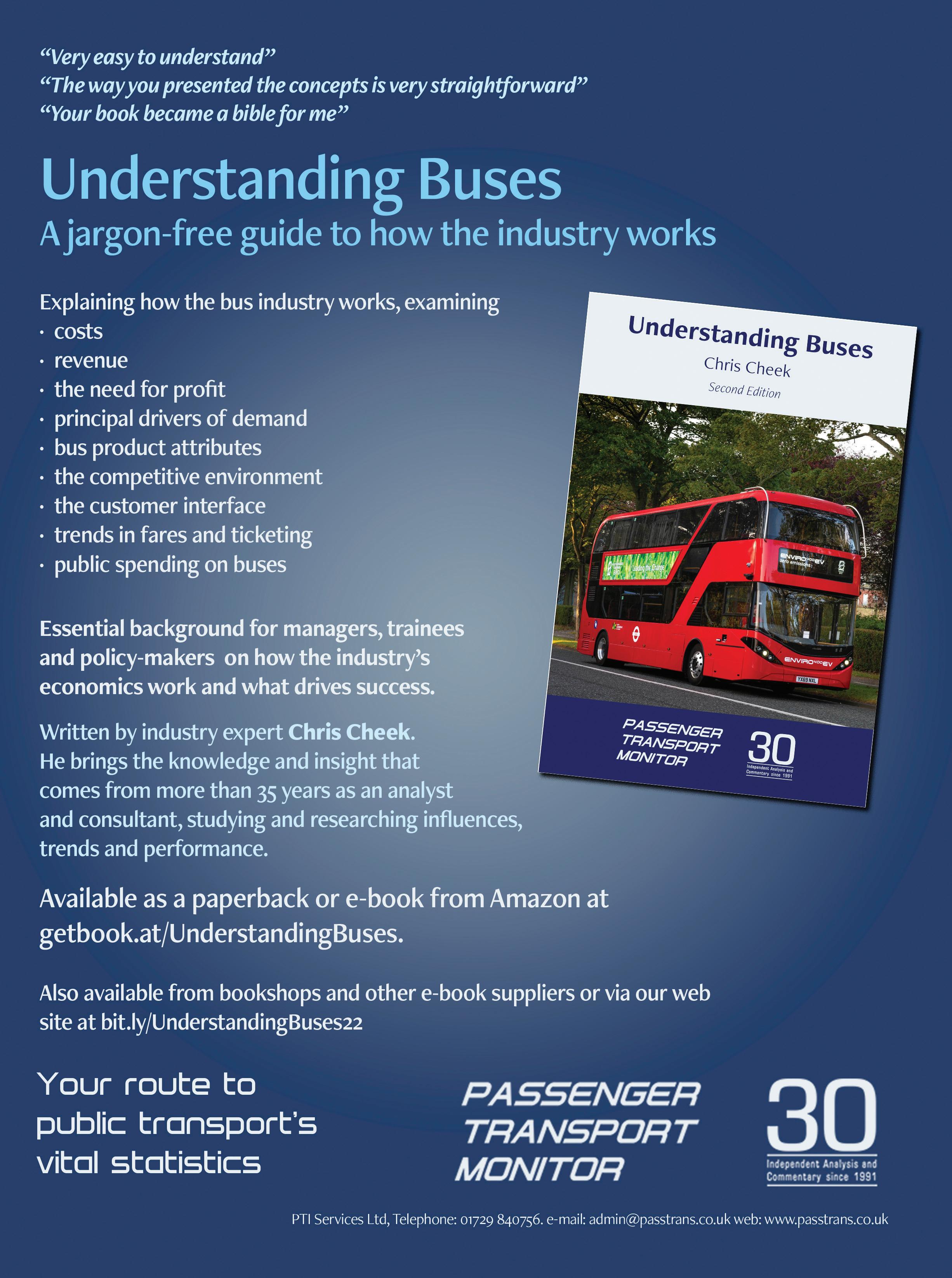
‘Britain’s buses need a timetable for Net Zero’
More than four in 10 new buses are now zero emission - but SMMT says an ambitious strategy is needed to deliver incentives and infrastructure
ZERO EMISSION BUSES
Buses are leading Britain’s race to decarbonise transport as Europe’s biggest market for the very greenest road passenger vehicles. Introducing an ambitious timetable of support, however, could mean the sector is the UK’s first to arrive at Net Zero, according to a new paper published by the Society of Motor Manufacturers and Traders (SMMT).
Manufacturers have invested significantly in green bus innovation with some 13 different zero emission models now available in the UK. More than four in 10 (45.1%) new single and double deckers joining British roads last year were either electric or hydrogen, and the market could be fully decarbonised as early as 2030 if all the right enablers are put in place. At present, however, the benefits - from improved local air quality and reduced noise
TRANSPENNINE TRIALS BATTERY TRAIN TECH
Hitachi Rail in UK’s first diesel-to-battery trial
ROLLING STOCK
Testing of the UK’s first intercity battery train has commenced. The battery, which generates a peak power of more than 700kw, has now been successfully retrofitted onto a TransPennine Express ‘Nova 1’ train (five-carriage intercity
pollution to a more enjoyable passenger experience - are unevenly distributed.
Of all new zero-emission buses registered last year, Greater London accounted for almost half (46.8%), despite the city accounting for fewer than one in six new bus registrations overall. While government support has enabled some specific cities to invest, uptake outside the capital is far lower. The rest of England outside of London took 30.3% of new zero-emission buses, while Northern Ireland received 3.3%slightly more than Wales, which accounted for just 2.2%.
Scotland, meanwhile, has enjoyed robust levels of zero-
emission bus uptake, accounting for 17.5% of all new ZEVs reaching the UK’s roads last year. This is in part due to operators benefitting from Scottish Zero Emission Bus funding, which is helping smaller bus and coach operators of scheduled services, such as rural community and home-to-school services, to decarbonise.
Equally, the national Zero Emission Bus Regional Area (ZEBRA) fund has been instrumental in spurring greater green uptake across the UK. However, the scheme’s lengthy grant application process and short-term application windows mean only the biggest operators with the most resources are
“Britain’s bus industry is in a strong position to become the first vehicle sector to decarbonise”
Mike Hawes, chief executive, SMMT
Class 802), ahead of the trial on Transpennine routes this summer. This is the first UK trial where a diesel engine has been replaced by a battery on an intercity train. The trial is a collaboration between TransPennine Express, Angel Trains and Hitachi Rail.
The single battery unit stores enough electricity to power more than 75 houses for a day. This impressive energy and power density will deliver the same levels of highspeed acceleration and performance, while being no heavier than the
successful.
Smaller and rural operators also face a tough challenge due to often longer routes and lower ridership, despite the opportunity of mass green mobility helping to boost passenger numbers in semi-urban and rural areas by as much as 65%.
SMMT’s new position paper, Next Stop, Net Zero: The Route To A Decarbonised UK Bus Market, sets out the case for a clear timetable to put every region, operator, driver and passenger on the journey to net zero.
Mike Hawes, SMMT chief executive, said: “With the biggest zero emission market in Europe, Britain’s bus industry is in a strong position to become the first vehicle sector to decarbonise. Reaching that destination, however, requires a clear timetable and appropriately ambitious support.
“Governments have played a vital role in driving uptake through grant funding, and every region should be supported so that all passengers can enjoy the advantages of going green. Only then will the full benefits of sustainable public transport be realised nationwide, a necessary part of our task to deliver Net Zero road transport.”
diesel engine it replaces. The installation of a battery will reduce emissions and improve energy efficiency. It is predicted to reduce emissions and fuel costs by as much as 30% compared to a typical Hitachi intercity train. Most importantly for passengers, the trial will test how intercity trains can enter, alight and leave non-electrified stations in zero-emission battery mode to improve air quality and reduce noise pollution. The battery has been manufactured by Turntide
Technologies in Sunderland, utilising the north east of England’s growing battery sector.
The trial will provide real-world evidence to inform the business case for a 100% battery-electric intercity train, capable of running up to 100km in battery mode. This range means battery technology could be deployed to cover the final non-electrified sections of intercity routes. It will also demonstrate how battery technology can cut infrastructure costs by reducing the need for overhead wires in tunnels and at junctions.
14 | 31 May 2024 www.passengertransport.co.uk NET ZERO
“It will be exciting to see what was once considered to be fanciful science fiction to be out on our roads”
Alexander Dennis joins Cambridge Connector
Bus builder will supply three buses to selfdriving vehicle project
AUTOMATED VEHICLES
Alexander Dennis has joined the consortium delivering the Greater Cambridge Partnership’s self-driving vehicle project, Connector, for which it will build three Enviro100AEV autonomous buses.
Backed by Innovate UK, the Connector project consortium already includes bus operator Stagecoach, IPG Automotive, dRISK and Gamma Energy. It is part funded and supported by the UK Government’s Centre for Connected & Autonomous Vehicles.
Alexander Dennis and its technology partner Fusion Processing Ltd, a leading provider of automated drive systems, have both joined Connector to provide the three Enviro100AEV electric autonomous buses as part of a four-vehicle fleet delivering services in Cambridge.
ARRIVA STAFF
8,500 Arriva employees have registered on Blink
COMMUNICATIONS
Thousands of Arriva UK Bus employees are now using a platform designed to connect frontline staff to the rest of the business. The Blink app was launched to bridge the communication gap and provide colleagues with digital access to everything they need to manage their day, with relevant and timely information supporting
The Alexander Dennis Enviro100AEV is a version of the next-generation Enviro100EV that has been fitted with autonomous vehicle technology.
Alexander Dennis, Fusion Processing Ltd and Stagecoach continue to demonstrate their joint expertise with the world’s most advanced and complex SAE Level 4 autonomous bus service in the CAVForth project in Scotland. The Connector project will build on this and previous
experience to adapt the vehicle and its technology for services at the Cambridge Biomedical Campus, the largest centre of medical research and health science in Europe.
Chris Gall, group engineering director for Alexander Dennis, said: “This is a fantastic opportunity to further the development of this technology with our partners as we continue to explore use cases where autonomous buses can improve
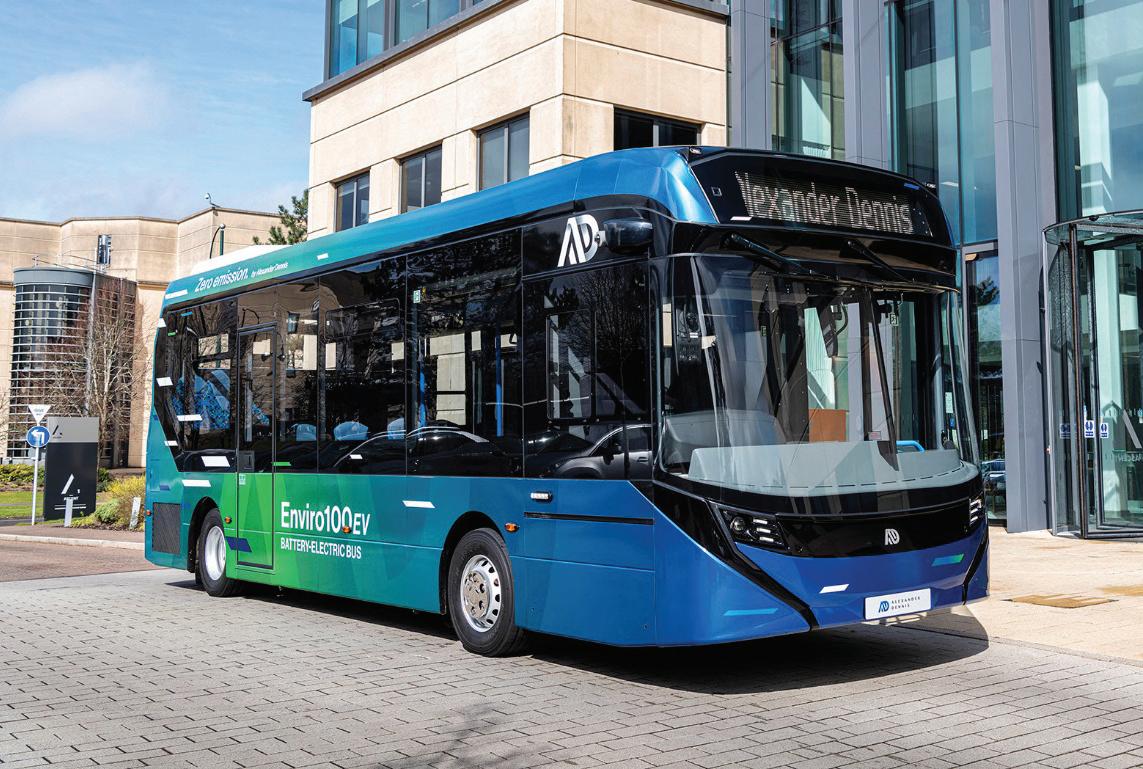
greater engagement and service delivery across teams.
Leading frontline app providers Blink worked with Arriva to use an app that would work for its staff. The app has already resulted in frontline colleagues engaging with a host of new features, including latest news, feedback and recognition, and chat. The app also links to existing human resources functions, as well as apps such as MyDrive, which means staff do not need to sign in to multiple platforms to access what they need. Having launched in London first, it has now been rolled
operational efficiency and add flexibility to transport networks.”
The trial will start with a selfdriving bus serving a route from the Madingley Road Park & Ride site around the University of Cambridge’s West Cambridge Campus and into Eddington. This is due to start welcoming passengers in late summer.
The second part of the trial will see three self-driving buses, provided by Alexander Dennis Ltd, offering services from the Trumpington Park & Ride and Babraham Park & Ride sites to the Cambridge Biomedical Campus from early 2025. Both services will run in addition to the existing public transport options in the city.
Cllr Elisa Meschini, chair of the Greater Cambridge Partnership’s Executive Board, commented: “For Cambridge to thrive now and in the future, the area needs the infrastructure and mass public transport systems to cope with the demand - autonomous vehicles are one part of this solution.
“It will be really exciting to see what was once considered to be fanciful science fiction to be out on our roads giving people choice in how they travel so I look forward to seeing how the pilots go.”
out across the country.
Lee Coleman, Arriva’s head of communications and engagement, said: “We have had an incredible reaction to Blink, and it’s great to see colleagues embracing change, actively engaging with posts, and sharing ideas.
“To date, more than 8,500 Arriva UK Bus colleagues have registered on Blink - with 93% of users actively accessing the app on average six times a day - demonstrating that this is already proving to be a core workplace platform.
“We don’t want to stop there
though. We are already in discussions to bring uniform ordering into Blink through single-sign-on and are constantly looking to optimise the way we work through Blink to help improve the employee experience.”
Blink’s CEO and founder Sean Nolan said: “By offering all employees Blink, Arriva have given easy access to critical information, systems and tools and facilitated direct, two-way communication.
“As a result Arriva have been able to improve operational efficiency setting a new benchmark for what the employee experience should be.”
www.passengertransport.co.uk 31 May 2024 | 15 INNOVATION & TECHNOLOGY
Alexander Dennis and Fusion Processing provide three Enviro100AEV electric autonomous buses
APP CONNECTS
COMMENT ELECTION 2024
NORMAN BAKER

What will July 4 mean for transport?
Rishi Sunak surprised everyone - including many in his own party - by calling an election which will most likely end his time in office
There have, Heinz-style, been 57 varieties of prime minister since the post was established with Sir Robert Walpole in 1721. He, in fact, holds the record for the longest incumbency, achieving almost 21 years in office before he resigned.
Of recent prime ministers, Margaret Thatcher comes in at No 7, clocking up 11 years 208 days. Tony Blair is not far behind at No 9, with 10 years 56 days.
The bewildering succession of PMs of late has seen occupants of 10 Downing Street merely waft in and out in relative terms. Bottom of the list at No 57, unsurprisingly, is the disastrous Liz Truss who lasted a mere 49 days and whose budget blew £74bn, yes billion, of taxpayers’ money, or around £1.5 billion per day in office. Mind you, that figure comes from the Daily Express which many regard as the world’s worst newspaper, so it might not be entirely reliable. No 56, incidentally, is George Canning who managed just 119 days but at least has the excuse that he died in office.
And what of Rishi Sunak? Well he sits at No 44 with 1 year 216 days, though I confess it seems longer. Many thought he would hang on until he passed the two-year mark which, barring a miracle on July 4, he will now not reach. In fact, he will not even catch another calamitous Tory prime minister at No 43, Anthony Eden of Suez fame - or infamy. So why did he go early, what is likely to happen on 4 July, and what does this mean for transport?
On the first question, theories abound as to why the PM called the election now rather than waiting for the autumn as nearly everyone expected. One is that he concluded matters could only get worse between now and October, with small boats plying their crossing over the summer, the IMF publicly warning against any further cuts to tax or national insurance, and no real progress on dealing with the multiplicity of problems within the NHS.
Another is that he wanted to go to the country before the Reform Party could get properly organised and eat further into the Tory vote, and to try to wrong-foot Labour.
A third is that he wanted to head off any threat to his position from within Tory ranks after a pretty dismal set of local election results where the Conservatives came third behind the Lib Dems in both seats and control of councils.
Whatever the reason, he has managed to bewilder and infuriate some of his own MPs who had been told they were safe to book holidays, and even more who regard an early election simply as a way of unnecessarily bringing forward what they suspect may be the executioner’s axe.
“The Electoral Calculus currently predicts Labour to win 479 seats, the Tories 92 and the Lib Dems 44”
Nor was the first week of the campaign anything other a disaster for him and his party. He went to the palace to secure a dissolution of parliament without consulting his cabinet first.
His rain-sodden appearance in Downing Street led to headlines about drowning not waving, and Drowning Street. Do they not have umbrellas in Number 10?
On his visit to Derbyshire, the two “members of the public” in hi-vis jackets who asked him questions were exposed as Tory councillors. He visited Northern Ireland (why? The Tories are not contesting any seats there) and headed straight for the Titanic Quarter leading a journalist to ask him the obvious question as to whether he was the captain of a sinking ship. He posed for a quick photo-op on a plane, standing next to an EXIT sign.
He announced he wanted to bring back National Service, something Tory MPs had been encouraged to deny just days earlier, and which is likely only to galvanise the 18-24 vote which generally has a poor turn-out but which is about 85% anti-Tory.
As to what will happen, we need only look at the polls which would have to be astronomically wrong if the Tories are to win again. Every single poll puts Labour way ahead, between 12 and 22%. Moreover, it is clear that, as in 1997, the electorate is taking an ABC approach - Anyone But Conservatives. The willingness to vote in each area for whoever is best placed to remove the Tories has taken root and is growing vigorously.
As in recent by-elections, we will see both Labour and the Lib Dems winning seats with huge swings to them, while scoring under 5% and losing deposits in others. Whereas Boris Johnson managed to win the so-called red wall in the north while retaining the blue wall in the south, this time around the former looks like reverting to Labour and the latter turning to the Lib Dems.
For instance, an opinion poll in Godalming and Ash, the seat being contested by the chancellor, Jeremy Hunt, puts the Lib Dems on 35% and the Tories on just 29%, down from 53% last time. It is no wonder that quite a few Conservative MPs have decided to stand down, some before they are pushed but others like the respected rail minister Huw Merriman because the idea of spending five years in a much diminished Tory party facing a potentially huge
16 | 31 May 2024 www.passengertransport.co.uk
“After the election, the main challenge to Labour will come not from the rump of Tory MPs”
Labour majority is far from appealing.
The Electoral Calculus currently predicts Labour to win 479 seats, the Tories 92 and the Lib Dems 44. One prediction even has the Lib Dems overtaking the Tories to become the second largest party, as they achieved in May’s local elections, and so the official opposition. Can it really be that bad for the Tories?
Personally I would not rule out the possibility of a hung parliament, though a Labour majority is clearly the bookies’ favourite.
So what does all this mean for transport?
In the short term, very little. Elections can be unpredictable - who would have thought that the most interesting event of the 2001 election would be then deputy prime minister and transport secretary John Prescott throwing a punch at a member of the publicbut barring a significant unforeseen event like a plane crash, transport is hardly likely to make it onto the radar between now and July 4.
Labour is fighting the election on the powerful case for “change” but in terms of rail, steady as she goes seems more applicable, as I set out in my last column for Passenger Transport (PT312). In terms of the bus, yes there should be change as the metro mayors embrace the idea of running buses again. By the end of the next parliament, 74% of all bus journeys in England could be on publicly-controlled routes.
Labour needs to change the pricing model for transport, end the absurd freeze on fuel duty which is not only leading transport up the wrong street but costing the Treasury billions in lost revenue, and then use that money to hold down, even cut train and bus fares. Sadly, I cannot imagine Labour leader Keir Starmer or shadow chancellor Rachel Reeves being willing to countenance such a necessary move. It is a depressing reflection on how far we have travelled - backwards - to remember that the fuel duty escalator was introduced by a Tory chancellor, Kenneth Clarke, to encourage modal shift away from private cars.
Labour also needs to find a way to lift councils off the floor if they are to play a meaningful role in driving change in transport. Again, there is no evidence that this is on the agenda of the Labour high command.
In terms of infrastructure spend, again Labour seems content to go along with plans inherited from the Tories. They should have, and still could, announce they intend, if they win the election, to look again at HS2
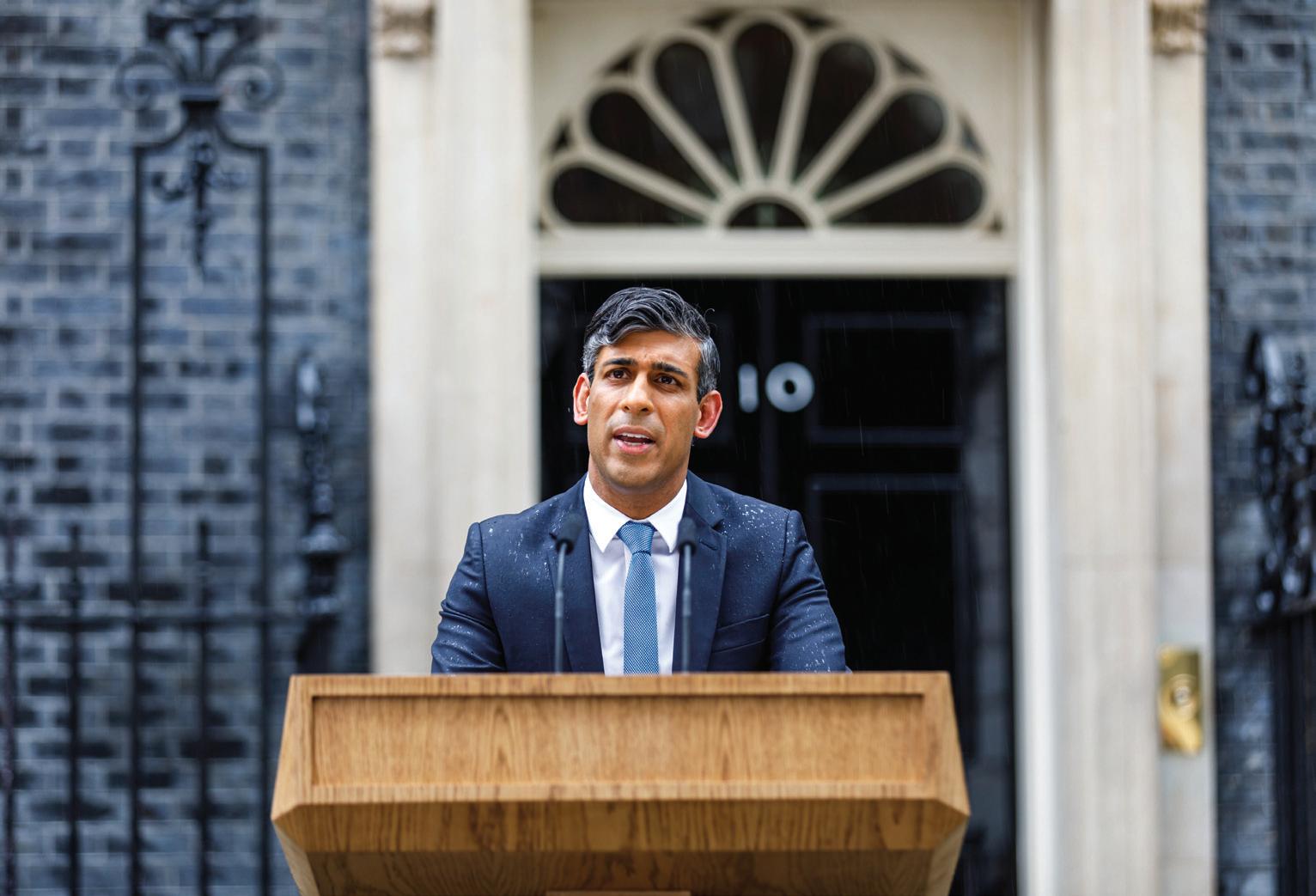
north of Birmingham, which would at least protect the line. A high-speed stump from Birmingham to Old Oak Common is frankly the worst of all worlds.
Rachel Reeves says she wants to rely on private finance to grow the economy. I hope this does not presage a return to the sorts of rip-off PFI schemes under Blair and Brown that, like loan sharks, gave you the money and demanded exorbitant interest.
But given her enthusiasm for private capital, Reeves should work with Greater Manchester mayor Andy Burnham and Richard Parker, the new mayor of the West Midlands, to give oxygen to the replacement HS2 scheme to link the two great cities that was already being worked up before the mayoral elections.
I predict Labour is going to get in a mess over the West Coast Main Line. As everyone in the rail industry, and very few in the public know, the case for HS2 rests on capacity needs, not speed, and the deeply regressive cancellation of the section north of Birmingham puts huge pressure on the existing line.
Yet Labour is, like the Tories, correctly enthusiastic about open access. So are they going to support Virgin’s application to run open access trains hourly up the main line to Preston, Liverpool and Glasgow? Or Lumo’s plans for a restoration of the LondonRochdale service? And what about their commitment to increase freight usage, some of which inevitably will want to use the
West Coast Main Line? As my mum used to say, a quart won’t go into a pint pot.
Politically after the election, the main challenge to Labour will come not from the rump of Tory MPs who will be pre-occupied with soul-searching and working out what they stand for, nor even from a likely much increased Lib Dem contingent (outwith a hung parliament), but from the metro mayors, 9 out of 10 of whom are Labour.
The mayors are already flexing their muscles, and relishing Starmer’s plans to give them more say over their local rail network, and the opportunity to “take back control” of their local bus services.
Writing in the i newspaper this week, Tracy Brabin, the mayor of West Yorkshire, fired a shot across Starmer’s bows, warning that the mayors are ready to “act as a collective voice to counter the Westminster and Whitehall-dominated discussion on the action needed to kick-start our national economy”. Meanwhile, the paper quotes a ‘Labour insider’ as noting there is already “distrust” between the party’s HQ and some of the mayors. We are going to hear more of this.
ABOUT THE AUTHOR
served as transport minister from May 2010 until October 2013. He was
Things can only get wetter: Rishi Sunak’s Downing Street announcement
www.passengertransport.co.uk 31 May 2024 | 17
Norman Baker
Lib Dem MP for Lewes between 1997 and 2015.
ALEX WARNER
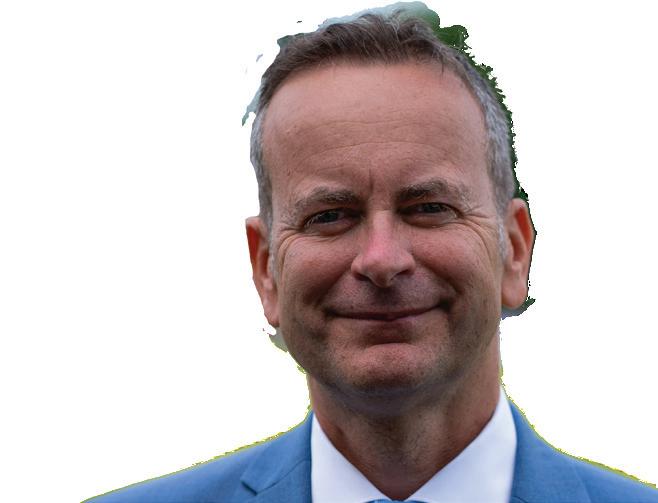
Sharp thinking to get bums on buses
Driven by its head of marketing, Laura Sharp, Go North East’s ‘Get your bum on board’ campaign aims to boost the bottom line
I’ll be honest, the bum has always fascinated me. It imbues trust, a reliable protective part of the body that is uncomplicated and doesn’t let you down. Unlike eyes, which need glasses to give them a hand, or teeth that require costly fillings, or ears that become fallible with a bit of wax - your bum never lets you down. My only gripe is that sometimes on trains, mainly SWR and LNER with those ironing board seats, backsides don’t provide as much comfort as they should - certainly for skinny oiks like me with bony bums - but I don’t blame the posterior, it’s the fault of trains. I never get this problem on buses.
It’s unsurprising, therefore, that I was recently captivated by the Go North East marketing campaign launched a fortnight ago - a rallying cry to the people of the North East to ‘GET YOUR BUM ON BOARD’.
I first stumbled across this ruse after a rousing photoshoot on the top of the Toon Tour bus, popping no-secco, holding blue and white scarves that the marketing mob had produced alongside 20% discounts on its Discovery tickets. This was all to celebrate this fantastic tour winning the Great Scenic Journeys UK Open Top Cup 2023 (PT313). Go North East’s head of marketing, Laura Sharp, took me aside to brief me on her rear-end campaign. Laura is fairly new to the bus industry and has incredible infectious enthusiasm.
In giving me a sneak preview of the campaign, Laura was joined by one of her sidekicks, Chloe Leach O’Connell, renowned
as a doyen of comms in the bus sector and someone whose energy is legendary. These two are a whirlwind together and the campaign cuts through the noise to showcase the fabulous benefits of the bus. It was launched in style with a flamboyant cast sashaying across the Millenium Bridge to catch a ride.
As part of the fun and games, the campaign involves six fabulously designed double deckers that feature fanciful bottom halves of the customers on board. These are set to be a firm favourite as people spot them out and about travelling across the network. The trail-blazing campaign will be visible across the whole of the region, from billboards to bus stop advertising and there will also be a massive push across social media, as well as a series of short videos

showing lots of tushie wiggling, a bit of rapping and no escape from the call to ‘GET YOUR BUM ON BOARD’. There’s a distinct Toon feel to the campaign too - it was noticeable when watching the footage that the word ‘bum’ is pronounced with a guttural feel - it sounded more ‘bom’ than ‘bum’, in truth.
The bus company believes its “cheeky” message is a winning way to raise awareness of low-cost bus travel which it says is crucial in encouraging people to get their derrieres out of their cars. It wants people from all walks of life to take note to start considering taking more journeys by public transport.
It’s no secret that Go North East customers have sometimes had a bum deal over the past year with a mix of congestion and prolonged strikes, coming off the back of Covid, which changed customer habits. Like pretty well everywhere, societal changes meant that Geordies lost their appetite to travel.
As a company, Go North East needed to do something different, a kick up the backside, and that’s what Laura explained to me: “We wanted to create one strong, universal message that would make us stand out amongst the noise. Traditionally, bus marketing has been quite conservative, so we aimed to mix things up with a clear and simple message that would resonate with all ages… and raise a smile or two!”
Laura continues: “It was key for us to really shout about the excellent value fares across the North East, thanks to North East Combined Authority, local authority partners, and the DfT. The £2 flat fare is such an easy, straightforward message for people to get behind. And anyone that’s 21 or under can travel for just £1!”
This isn’t just posterior posturing from Go North East, the stats show that over the past 12 months, it has seen over over 11 million jacksies resting on seats, having used the £2 single, and another 5.3 million journeys made by young people with the £1 ticket.
I’ve been worrying quite a bit lately about how the sector will present itself when the £2 fares offering comes to an end. It will need a determined effort and real conviction of the kind that Go North East are using to deal with the post pandemic challenges. As Laura emphasises: “It’s about breaking routines that were formed during that period. Whether that be fewer retail visits, more reliance on the car, or the increase in working-from-home. If we
18 | 31 May 2024 www.passengertransport.co.uk COMMENT
Go North East’s ‘Get your bum on board’ campaign
“We wanted to create one strong, universal message that would make us stand out amongst the noise”Laura Sharp
can focus on value fares, harnessing the green agenda and attracting people back to using buses with creative and targeted marketing, we’re confident we’re moving ever closer.
“There is way more to do to land the message that bus services are getting massively better in the North East. Our existing bus users know about the lower fares and better frequencies, but we need to get our message out to non-users who are less aware. This is where this campaign comes in. We’ve gone BIG with our messaging and have rolled it out across the region using radio, roadside advertising, bus wraps, and social media”.
The biggest challenge will be getting people to break their routine - once they try the bus, they realise how cost effective and convenient it is. From a marketing perspective the fares cap has created a simple and attractive offer for customers. The North East is in a great position with the current fares offer. “We have a ‘One, Two, Free’ fare structure: £1 for under 22s, £2 for adults and free for ENCTS pass holders. We’re seeing passenger growth every month and hope that the new campaign will further this!”
Complex fare structures have, in the past, created real barriers, the £2 fare has set a precedent across the industry and we’ll need to learn from this and use it to inform pricing strategies in the future. I strongly believe that the bus sector has really upped its game in recent times in terms of extolling the positives of bus travel, trying to create reasons to travel and just developing a fun narrative - more so than rail, where there still seems a bit of an authoritarian ‘you need us more than we need you’ tone. In some of the scenic bus routes and tours, there’s been a galvanising impact on customers - these exciting showpiece services set the benchmark and are, in some respects, an introductory taster or gateway to the bus company and its brand. They are a celebration of the community and the landscape served.
Laura agrees: “The Toon Tour is a brilliant offer for the leisure and tourism market up here in the North East. It’s hugely popular with partners and stakeholders around the region, as well as customers. It’s fantastic to see the bus become a staple part of the leisure industry positioned as not just a means of getting from A to B, but an attraction in itself.” The quality of marketing in the bus sector currently is increasingly impressive. The advent of sun and a Bank Holiday weekend
saw an influx of positive stories from bus companies - be it promoting festivals, events and great destinations on their patches, to the razzmatazz of marketing an open topper service being unleashed. There’s a growing and unprecedented intensity at a time when it might be easy for the industry to be lazy and just think that a simple £2 fare offering selfpromotes. And don’t be kidded into thinking that the industry is spending oodles on its marketing - it isn’t. Most companies’ marketing budgets are miniscule and they do the best they can just by thinking innovatively, forming partnerships with stakeholders under young sharp-thinking marketers like Laura.
Partnerships can extend to collaboration with fellow operators, but in a way that, of course, complies with competition rules. An example has been our very first ticketing and marketing product that we have this week launched at Great Scenic Journeys - a multi-operator ‘Scenic Explorer’ rover ticket for North Yorkshire, which is an all-day ticket for £10 that enables unlimited travel on almost all buses in the region from as far afield as Leeds and Middlesbrough into the heart of this stunning part of the UK. What’s more up to five folk can travel for only £19. This offer has been made possible due to fantastic collaboration between North Yorkshire County Council, Arriva, Blazefield and East Yorkshire Buses and our campaign is all about shining a light on the incredible scenery and places to visit. I’m hoping we can work with other operators and local authorities to roll out similar products.
I admit that before the £2 cap, affordability of travelling by bus wasn’t an issue for mebut I am one someone who enjoys watching my pennies and the £2 offering has made me travel more. Combined with some great journey experiences, it has made me realise more the potential of our great sector. Even as someone who has worked in it now for many years, I still needed convincing at times to make a journey. Take my trip to watch cricket at Hampshire’s ground last weekend, which is situated in the rear-end of nowhere. Rather than make long walks to Southampton city centre or the nearest train station, Hedge End, I merrily paid my £2 fare, forgetting even, until prompted by the driver, that the price had gone down to only £1 for my post-match trip in the evening. I enjoyed journeys over three days that were always on time and on Bluestar buses
that were brilliantly branded and with friendly drivers. So too, earlier in the week on Southern Vectis on the Isle of Wight where every step of the way drivers rolled out the red carpet.
I genuinely feel the bus sector is on the cusp of something big here and the Go North East campaign is one example that gives me real confidence. All of the owning groups, in their own way, appear to be taking a more multifaceted approach to marketing, mixing a more strategic approach to digital, in combination with traditional print and also field marketing. My only fear, despite my excellent experiences, is that in a minority of owning groups, the emphasis has been so strategic and sophisticated than in previous times perhaps, that oversight around product management could be better and the marketing promise is often not delivered. There’s not enough ranting, railing or rockets from the marketers towards the operating company teams who might be letting them down with a lack of attention to the detail of the proposition.
For now, though, I’m getting my scrawny tush on board buses galore over the coming weeks - not that I needed Laura’s short and sharp direction to do so - but I’m doing so with greater vigour and confidence. It’s a culmination of a few observations of late, some interactions with a bunch of fantastic marketing managers across all the owning groups and a feeling that their value and importance is being recognised internally more than ever. It’s a team effort in making a real step-change and legacy in changing customer behaviours, somewhat in adversity, I genuinely, more than ever, feel that the industry’s rigorous marketing and enhanced customer service mean that we can pull it off. There are no ifs or butts about it, these are encouraging times and we’re close to a big celebration - bottoms up, everyone!
ABOUT THE AUTHOR
Alex Warner has over 30 years’ experience in the transport sector, having held senior roles on a multi-modal basis across the sector. He is co-founder of transport technology business Lost Group and transport consultancy AJW Experience Group (which includes Great Scenic Journeys). He is also chair of West Midlands Grand Rail Collaboration.
www.passengertransport.co.uk 31 May 2024 | 19
COMMENT BUS FRANCHISING
CHRIS CHEEK
Labour’s bus plans - no more tinkering?
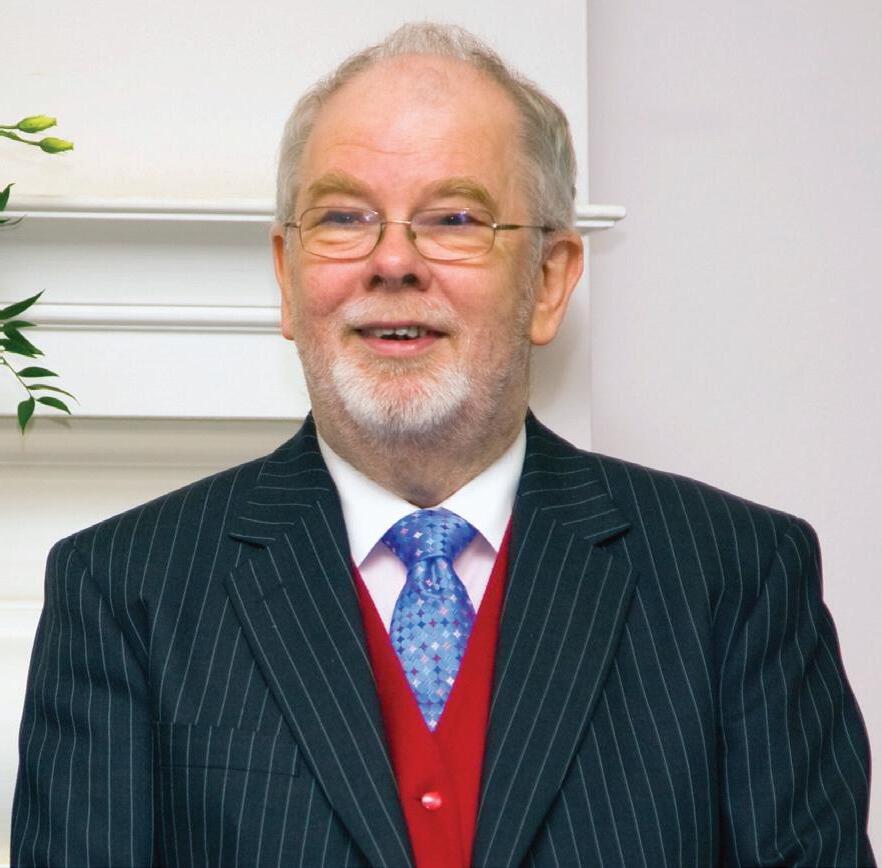
Bus franchising looks set to be rolled out in new areas, but time and due process could yet prove to be the enemy of radical reform
Whatever the outcome of the General Election on July 4, it is increasingly likely that, by 2030, the commanding heights of the UK bus industry will be specified and controlled by the public sector. This was clear even before the recent local elections, but the election of Richard Parker as the new mayor of the West Midlands means that all the combined authorities in the conurbations are committed to implementing this approach over the next five years, alongside the West of England, Cambridgeshire and Peterborough. If all goes according to plan, they will be joined by the whole of Wales and the Strathclyde area of Scotland. The latter is a little less certain, since the procedures for establishing a “local franchise” under the Transport (Scotland) Act 2019 require an additional layer of consent from a panel convened by the Traffic Commissioner, rather as Tyne & Wear did in 2015.
Finally, if - as expected - Labour wins power at Westminster later this summer, the party is committed to “making it easier” for local transport authorities outside the conurbations to adopt a franchising model as well. However, all may not be quite as it seems. The rhetoric is strong: “no more tinkering on the edges” said shadow local transport minister Simon Lightfoot at CPT’s conference in January, though he quickly qualified this by saying “we won’t be able to deliver as quickly as we would like”. And again last month, when shadow transport secretary Louise Haigh
promised new reform legislation “during the first term of a new Labour Government” before going on to assert that this would “require no additional central government spending”. It would, she claimed, permit local authorities to introduce franchising “in as little as two years”, and save hundreds of bus routes. Assuming for a moment that the Department for Transport wins a slot for a bill in the second session of a new parliament (November 2025 - July 2026), the planned primary legislation and its associated secondary legislation could be expected to come into force in middle or late 2027. If the authorities wanting to use their new powers moved very quickly, and the two-year promise was deliverable, franchise implementation could begin in the summer of 2029.
A more pessimistic scenario sees the Bill delayed until the third session (2026/27), putting enactment back until late 2027 or even early 2028. It is not inconceivable that the required detailed regulations could be further delayed, so that the new law would not be implemented until 2029, around the
AUTHORITIES PURSUING FRANCHISING
England: Cambridgeshire & Peterborough; Liverpool City Region; North East; South Yorkshire; West Midlands; West of England; West Yorkshire
Scotland: Strathclyde Partnership for Transport
Wales: The Welsh Government
time of the next General Election. Allow local authorities a year to deliberate and prepare their business cases, and then allow a more realistic three year implementation period and we’re into 2033, which could well be the year of the General Election after next.
Thus, non-metropolitan authorities could wait at least five and possibly up to 10 years before the reform could be implemented. Of course, authorities that wanted to move more quickly to a franchise could do so much earlier under the provisions of the 2017 Act. But this involves a demanding process of writing a full five-part business case to Treasury standards. However, most local transport authorities would lack the ability to fund such a business case, so would await Labour’s promised easier path to franchising.
This likely delay may seem a minor point, but is actually quite important - because we now have two additional layers of uncertainty in the bus industry equation, so deterring potential investors and existing and potential SMEs (and that’s before we even talk about Sadiq Khan’s nationalisation plans for London). All this at a time when the need for investment funding is rising and investors are above all seeking some stability before committing funds. Meanwhile, the likelihood of there being any cash to fund public sector investment in the sector sits on a scale ranging from extremely unlikely to no chance.
Operators and their investors seem at the moment to be much more relaxed about the moves towards re-regulation outside the capital. The major players, especially those involved in overseas markets, are well used to competing for business through competitive tendering. It is, after all, the default mechanism for bus service provision in many parts of the world. The operating risks are well understood, and any financial uncertainties are reduced by the fact that the tendering authority retains revenue risk. In many cases, the authority also retains ownership of key assets such as vehicles and depots. This minimises the need for the operators to fund capital investment, reduces the capital employed and therefore the size of the required profits.
The emerging Enhanced Partnership (EP) arrangements in other parts of the English market (and the BSIPs in Scotland) are also reasonably attractive to investors. True, revenue risk is retained, but is then offset by
20 | 31 May 2024 www.passengertransport.co.uk
“Non-metropolitan authorities could wait at least five and possibly up to 10 years”
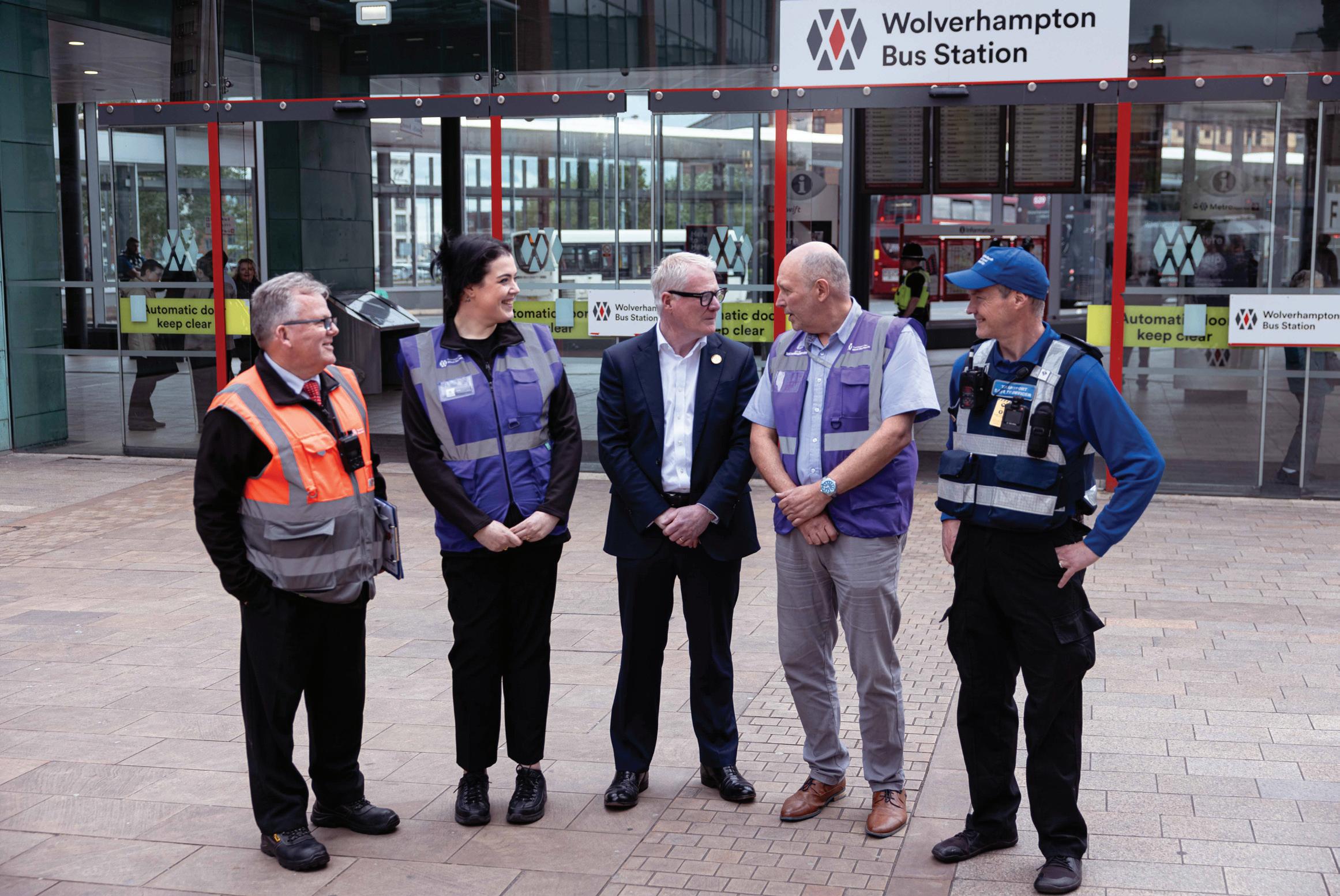
reductions in the risk of competition, and the retention of some measure of commercial freedom. The reduced risk of competition is partly a function of the current poor state of demand, but also reflects the power of incumbency and the entrenched nature of a successful relationship between local transport authority and local operator. Not for nothing do academics and analysts studying bus markets in other parts of the world warn of the dangers of too cosy a relationship, often referred to as “regulatory capture”.
Which brings us to the SME sectorbattered by Covid, cost inflation, high interest rates and downward pressure on tender prices. Many are already fearful of the cost and complexity of introducing zero-emission vehicles, and suddenly they are faced with the prospect of losing their business in new moves towards franchising - a move that could happen at any time once new legislation is passed. What incentive would there be to invest in complicated new technology
with that hanging over you like the sword of Damocles? Much better to take the latest offer from the major group up the road and retire.
It is already clear that, despite protestations and declarations of faith, the sector has missed out badly in Greater Manchester’s franchising process and the recent Welsh retendering exercise. The cost and complexity of bidding is a powerful disincentive to their involvement in the franchising process, and it is difficult to see how this can be overcome without compromising the compliance requirements of procurement specialists in franchising authorities.
Even throughout the previous nationalised period in the 1970s, small operators continued to prosper and provide locally focused services to their home communities, providing home to school transport, private charter and excursions alongside the bus service. Their loss now would be another serious blow to life in rural and semi-rural areas.
It’s clear that the arrival of a new Labour
government in Whitehall, widely expected in a few weeks, will herald another round of reform for the bus industry. However, those of us with long memories might recall the promises made by Claire Short and her shadow team at a similar point in the electoral cycle in the 1990s and compare them with the legislation enacted three years after the election … and then consider the actual outcome.
Meanwhile, it looks as if “no more tinkering at the edges” might not be as firm a statement as might have been thought. Time and due process could yet prove to be the enemy of radical reform. We shall see.
ABOUT THE AUTHOR
Chris Cheek has worked in the public transport industry for over 44 years, the last 19 as an analyst and consultant. He is Managing Director of Passenger Transport Intelligence Services, (formerly TAS Publications & Events)
www.passengertransport.co.uk 31 May 2024 | 21
The election of Richard Parker (centre) as the new mayor of the West Midlands means that all the combined authorities in England’s conurbations are committed to bus franchising
COMMENT
NICK RICHARDSON

Are we riding on an electric wave?
A recent ride on one of my local operator’s new electric buses highlighted how the vehicle is only part of a much bigger package
Recently, I took a ride on one of my local operator’s new fleet of electric buses. These are presented well, looking smart and operating quietly around the city. Externally, the livery is thankfully devoid of too many logos, and cameras replace mirrors (although a couple of kerb hits suggest that drivers need to get used to them). The interiors are much the same as conventional buses although there was an absence of visual and audible locational information, something that will presumably be remedied in due course. Most of the local network is covered by decent and relatively new diesel buses operated by two large operators with increasing numbers of electric buses as they are delivered to displace those previously working key routes. However, while launched in the usual way with a photo opportunity, there isn’t wider publicity that might reach anyone who isn’t a regular user. Getting into the bus habit requires bombardment of the non-believers for which electric buses could be a stimulant.
Investment
A new depot is being built opposite the current one, the latter being far from ideal. This new site has now been cleared in anticipation of a facility that will house the electric fleet and provide space for everything needed. Currently, part of the site is used for overnight bus parking as it has for some years under the previous ownership with others parked on the highway due to the limited
space in the depot. Ironically, the former bus depot next to the new site was redeveloped as a block of flats with a nod to the previous occupants in naming it ‘Southdown View’. Depots for electric buses need space to access multiple charging points so the new facility should work well and represents a longawaited major investment in the city’s bus activities. With government funding help, the vehicles and supporting charging equipment are appearing in this and many other locations to present a new image to would-be users.
The new vehicles are part of a wider plan to entice more users onto buses but this also need to address some of the basics. The stop where I joined the bus has a helpful list of departure times and a real time display but nothing to say
where the bus actually goes: it’s simple really - where to, how often, how long it takes and how much it costs. This is a fundamental problem, and assuming that customers know what they are doing is complacent and narrow-minded. Something is needed to show what the offer is - ideally replicated before anyone gets to the bus stop - and how it features new electric vehicles, capped fares and so on. The other difficulty is that many bus journeys are painfully slow, offering plenty of stops for regenerative braking but taking far longer than other options. For my journey example, there are 33 bus stops along 12km of route with multiple junctions and other obstacles to negotiate and limited bus priority measures, taking 50 minutes. For many journeys, cycling is quicker or walking shorter journeys compares favourably; equivalent car journeys are generally notably faster. The local geography is an influence but the numerous bus stops, often within sight of each other (the closest stops are a mere 170m apart) and the lack of priority mean that a bus journey can take a long time, although works are underway to improve matters. The road layout in the city centre requires going around the block and two busy roundabouts are negotiated twice, once to get to a bus stop then again on the way out so going round in circles happens several times on every journey. Much of the problem is based on the fact that there are only three road routes onto the island on which much of the city sits, one of these being a motorway although this does feature an adjacent park and ride site. A consequence is that should

are good
see but a deeper look is needed to make sure they are truly sustainable 22 | 31 May 2024 www.passengertransport.co.uk
Electric buses
to
www.ciltuk.org.uk
Tel: 01536 740100

@ciltuk
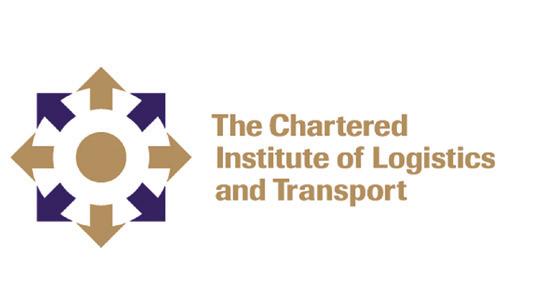
delays occur in one location, congestion spreads quickly from which there is no escape. Identifying rapid routes for buses within these constraints would provide an attractive option for people who otherwise drive.
Spreading the electric fleet
Government has been handling out money to enable operators to afford electric buses and the infrastructure that goes with them. The first round of Zero Emission Bus Regional Areas (ZEBRA) in England awarded £268 million to 16 local authorities. The second round provided £142.8 million for 955 new vehicles and associated works; some was for electric buses in rural areas, an aspect that has received more emphasis than previously. Big recipients included Tees Valley (62 buses), Liverpool City Region (58), Gloucestershire (58), Derbyshire (57), Essex (55) and Plymouth (50) and the majority were for electric vehicles with a relatively small showing for hydrogen fuel cell vehicles. Funding on this scale is certainly welcomed but in time, the differential cost between diesel and other fuelled buses could reduce to a point where operators will not need government support. A notable absence from the scheme is biogas for which there are fleets working very successfully.
Digging deeper
However, not all is as simple as it might appear. There seems to be a view in government that a consequence of providing new buses is that suddenly more people will want to use them. This remains to be seen because vehicles are only part of a much wider picture with multiple aspects that need to fit together before anyone decides to try them. As per my example above, electric buses are most effective where service information is clear and there are a host of other attributes. Many people are not swayed by environmental credentials anyway, not least when government displays a lack of commitment to targets or doing much that addresses fundamental environmental problems.
The other difficulty is that the vehicles operate at the end of the supply chain that might appear to be environmentally responsible but often is not - an electric vehicle is only sustainable if the energy is provided in an appropriate way. Electricity is derived from

“Many people are not swayed by environmental credentials anyway”
various sources, not all of which are sourced sustainably. For example, Drax power station is fuelled by biomass pellets which on the face of it is a huge step forward from coal burning. However, the biomass comes mainly from North America on a diesel-powered vessel before being loaded onto trains at the Port of Liverpool to take a circuitous route to Drax. The plant consumes the equivalent of 27 million trees annually and according to BBC reports, provided 11% of the UK’s electricity in 2020. It is supported by £824m of government subsidy but is the UK’s single largest source of carbon dioxide.
There is little point in running hydrogen vehicles if the fuel is brought by tanker from somewhere else so proximity to a hydrogen hub is needed. Similarly, moving biogas by road defeats the object of operating biogas buses and, as Reading Buses has shown, can be
sourced sustainably when coupled with on-site plant. Electric generation and distribution remains a difficult problem in the UK with limited capacity. We are told that the new nuclear plant at Hinkley Point C will solve a lot of problems but at astonishing cost and with a long lead time, not to mention dealing with waste that we still don’t know how to dispose of beyond burying it in a very deep hole in the ground.
Electric buses are good to see and are emission-free at point of use but a deeper look is needed to make sure they are truly sustainable and not just consumers of scarce resources. Hopefully they will draw attention to the bus offer and attract new users if the package of improvements of which they are a part is formulated in the right way.
Nick Richardson is chair of CILT’s Bus and Coach Policy Group and is a former chair of the Transport Planning Society. In addition, he has held a PCV licence for over 36 years.
IN ASSOCIATION WITH:
ABOUT THE AUTHOR
www.passengertransport.co.uk 31 May 2024 | 23
First Bus Solent is introducing 62 electric buses

“Will the next secretary of state for transport finally be brave enough to embrace road pricing?”
GREAT MINSTER GRUMBLES

Dear Secretary of State.. good luck!
Our Whitehall insider imagines what’s going on inside the minds of the mandarins at Great Minster House, home of the DfT
Well, well. So Rishi Sunak finally decided to go for broke and call a general election for July 4, months ahead of the general consensus that it would be held in the autumn, And it seems it caught most of his own MPs off-guard, with a fair few reported to be spitting tacks that he has done what he has done - presumably because they know they will be unemployed sooner rather than later!
So life in the civil service will quieten down for a few weeks while the political parties hit the campaign trail. We will have to do a bit of work to prepare the standard briefs for a new government and incoming ministers, but other than that it will be pretty quiet. Time to clear out the filing cabinet and email inboxes and reflect on what might happen over the next few weeks as Rishi Sunak and Keir Starmer knock seven bells out of each other.
But it’s a foregone conclusion, isn’t it. The only issue is how large Labour’s parliamentary majority is going to be. In my view, this is a general election to lose. The economic situation is not as rosy as you might think following the drop in inflation to 2.3% and an expectation that the Bank of England might well cut interest rates during the election campaign. Tax receipts have been lower than expected over the last few months and, following various government give-aways, the room for further tax cuts has evaporated.
Which makes shadow chancellor Rachel Reeves’ commitment that a Labour government won’t increase income tax or
National Insurance really rather interesting. Because that means she is effectively committing Labour, when it wins the general election, to spending cuts when she carries out her first spending review. The tax raids on nondoms and the imposition of VAT on private schools is a drop in the ocean compared to the wider squeeze on the public purse. It’s going to be interesting to see how the electorate, and Labour’s support base, reacts to the notion that a Labour government will actually cut public spending rather than increase taxes to pay for “better” public services.
What does all of this mean for us here in Great Minster House? Not much, actually. We all know what Labour wants to do with public transport - which will be a challenging
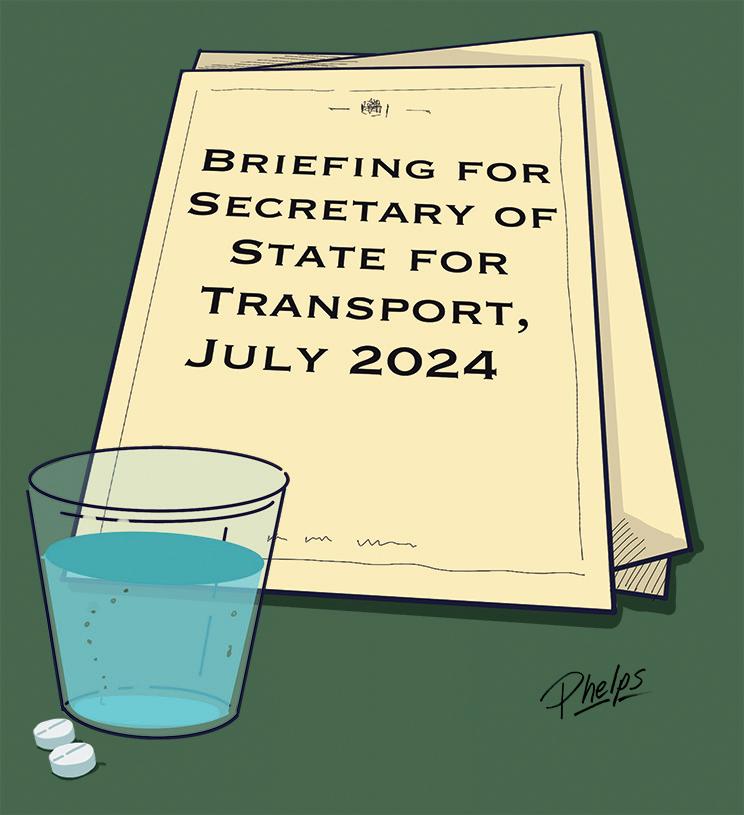
policy agenda given the lack of money - and other parts of the transport portfolio such as aviation, ports and shipping will be left untouched. But here’s a thought. Let’s assume Labour secures a large enough majority that it will see through a full five-year term in office. That takes us to 2029. What will the transport landscape look like by then? Will we have fully autonomous cars on our roads? What impact will advances in technology have on the way we travel by 2029? What will have happened to patronage levels on public transport? Will they have recovered to pre-pandemic levels or even increased well beyond them? Or will changes in work and social pattens mean that we use public transport even less? Will the next secretary of state for transport finally be brave enough to embrace road pricing?
To whoever is the next secretary of state for transport, all I can say is “good luck”. Because you will need lots of it. Technology will change our travel needs and behaviours beyond recognition with consequences for the policy agenda. And you won’t have any money to spend beyond what is already in our transport budget. You will disappoint a lot of people, and if you happen to be a Labour secretary of state that means disappointing a lot of your friends and allies, including the Labour mayors who now dominate the regional landscape. You might become pretty unpopular with your own community pretty quickly.
And what of the devolution agenda? Labour promises a ‘Giving Back Control’ Bill as a priority in the first session of the new parliament. But, in a tight fiscal environment, how much control will be devolved? If devolution doesn’t come with extra money or money-raising powers, what’s the point?
I have said it before, and I will say it again.
The political rhetoric we are hearing from Labour, all of which is entirely understandable, is going to crash headlong into political and financial reality, pretty much the day after the general election.
On the night of July 4 and the morning of July 5 Labour might well be partying like there’s no tomorrow. But the hangover could be heavy and long. When reality dawns, and that collective Labour government headache kicks in, trust me, it won’t be a pretty sight. I hope Keir Starmer and Rachel Reeves have a strong stomach and a medicine cabinet full of paracetamol!
COMMENT
www.passengertransport.co.uk 31 May 2024 | 25
CAREERS
Lumo’s first year of training partnership
Scheme aims to support those seeking a career in travel
Train operator Lumo has completed its first year of partnership with Newcastle College, focusing on training future travel and tourism professionals.
The open access operator hosted four groups of students in a 6-week work experience placement at its Newcastle headquarters, located on the former Stephenson locomotive works site.
Recognising a gap in rail sector placements for travel and tourism students, Lumo and Newcastle College launched this program to provide opportunities for young adults in the region. The initiative involved 50 travel and aviation students, offering them firsthand
FIRST BUS’S EDI MILESTONE
Group is first bus operator to win scheme accreditation
First Bus has become the first UK bus operator to achieve Bronze status from Inclusive Employers.
The Inclusive Employer’s Standard is a workplace accreditation tool that measures inclusion and diversity within an organisation and evaluates its progress on a variety of equality, diversity, and inclusion (EDI) initiatives.
To obtain this accreditation, First Bus responded to 35 questions covering all protected characteristics and broader EDI themes, providing over 250 pieces of evidence and more than 10,000 words detailing

experience in the rail industry.
The programme emphasises real-world experience, preparing students for various roles.
Participants worked onboard trains, interacting with customers and the planning team, solving problems, and adjusting live train
its efforts. These questions were categorised into six areas: engage, equip, empower, embed, evaluate, and evolve.
Achieving Bronze status recognises First Bus’s commitment to integrating EDI initiatives into its broader transformation plans.
Inclusive Employers noted First Bus’s range of inclusion activities and various methods for increasing involvement and engagement, commending its efforts to create an inclusive environment.
“We’re incredibly proud of this achievement, but recognise we’ve still got lots to do on our journey to being a place where everyone feels welcome, can be their true selves and succeed.” said Kevin Green, First Bus’s chief people officer.
to develop and enhance their transferable skills, ensuring they are well-prepared for their future careers.
“Historically many of our students favour a career in aviation, as to date there has been significantly more opportunities,” said Tanya Brown, curriculum lead at Newcastle College. “We’re keen to show them the endless possibilities of a successful and fulfilling career in the rail industry. The partnership with Lumo has done exactly that. A programme designed specifically for college students, to gain realistic experience and develop practical skills that they can carry throughout their career. We’re excited to see what the future holds, as we continue our partnership with Lumo.”
schedules.
As part of the programme, students are not only exposed to the industry through practical experience but also receive comprehensive career support. This includes mock interviews and coaching sessions, designed
TAYLOR NAMED WIGHTLINK CHIEF
Former Go-Ahead director joins Isle of Wight operator
Katy Taylor, Go-Ahead’s former chief customer and strategy officer, has been appointed as CEO of Isle of Wight ferry operator Wight Link.
Taylor joins from Southern Water where she has been chief customer officer since 2021.
Commenting on her appointment, Taylor said: “I am delighted to be joining the Solent’s leading ferry operator as it transforms its business to meet future challenges, including decarbonising its ships and shore facilities to meet Net Zero targets and building greater links with the local communities.”
Lumo and Newcastle College are planning for the 2024/25 term, aiming to expand opportunities for young people in the rail industry. They hope to encourage more students, as well as many customers, to choose train travel over flying.
WILD JOINS HS2 AS CHIEF EXECUTIVE
Former Crossrail boss takes on key HS2 Ltd role
Former Crossrail chief executive Mark Wild has been named as chief executive of HS2 Ltd.
Wild was selected following a rigorous recruitment process overseen by the HS2 Ltd board and led by executive chair Sir Jon Thompson.
His arrival follows the departure of Mark Thurston who led HS2 Ltd for six-and-a-half years up to the end of September 2023. Thompson will continue in his current position as executive chair until Wild’s arrival, when he resumes his previous role as HS2 Ltd chair.
Lumo ambassadors pictured with placement students
26 | 31 May 2024 www.passengertransport.co.uk
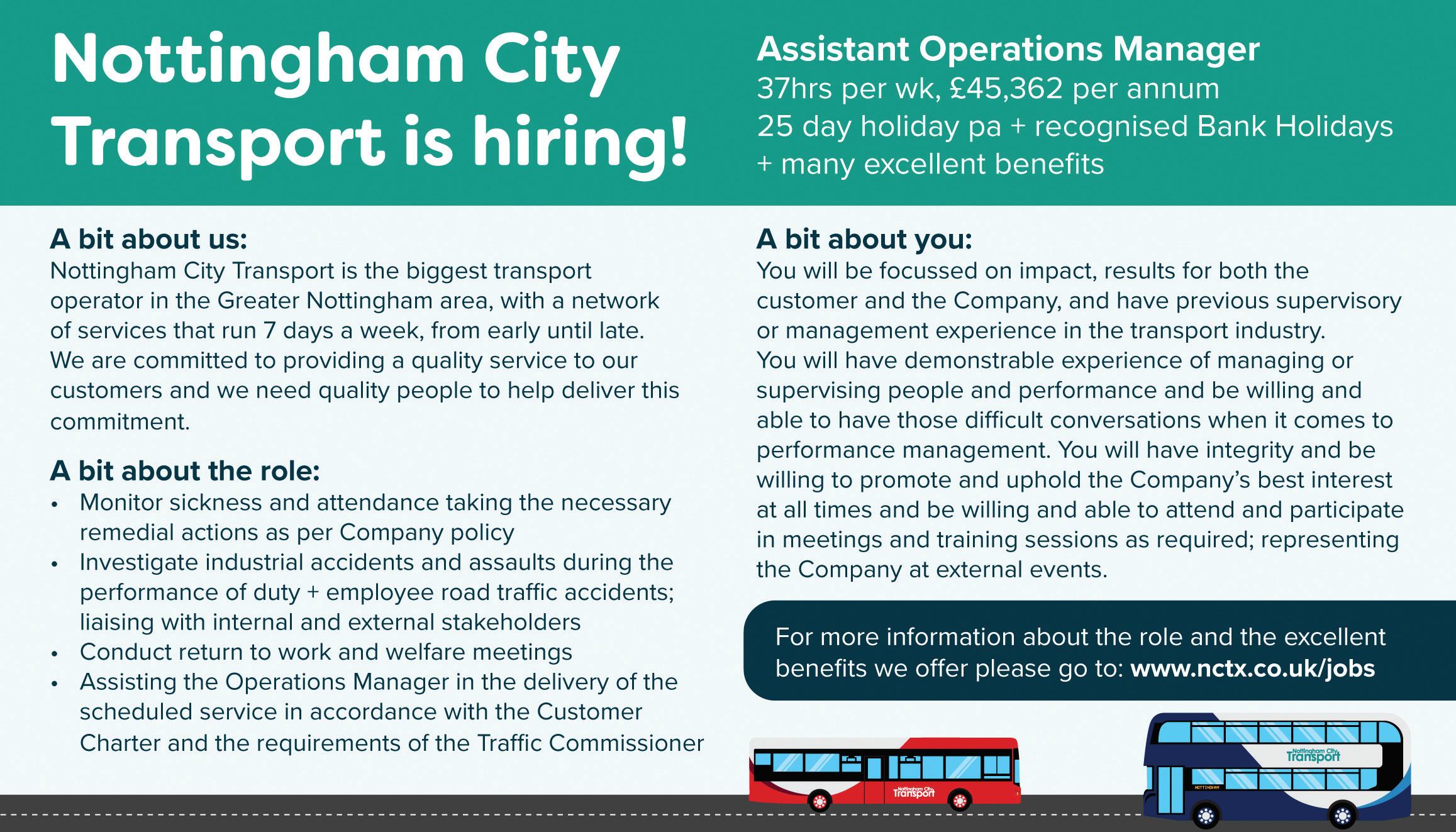
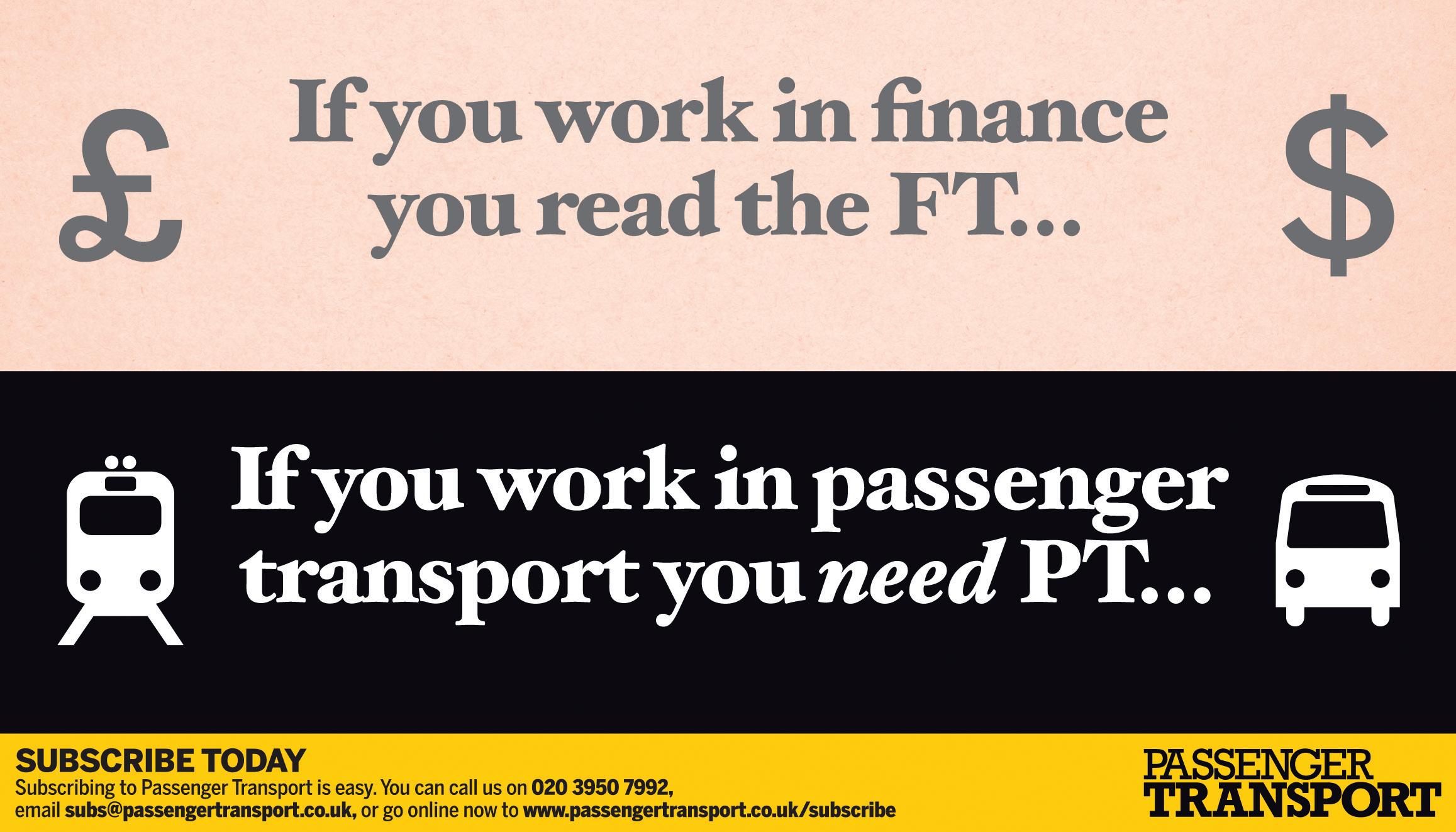
CALL NOW TO ADVERTISE 020 3950 8000 or email sales@passengertransport.co.uk www.passengertransport.co.uk 31 May 2024 | 27
DIVERSIONS
Doggy delights at station book launch
Rupee is ready to help nervous train travellers
Visitors to Yatton station in Somerset recently found themselves taking time out to paws with a furry friend who’s stealing the spotlight in a new book aimed at easing train travel nerves.
Rupee, the adorable shih tzu cross, was the star attraction at the launch of Rupee and Sushi Travel By Train. The book is the perfect companion for anyone making their first journey by rail. Written by Carys Thomas, a safety
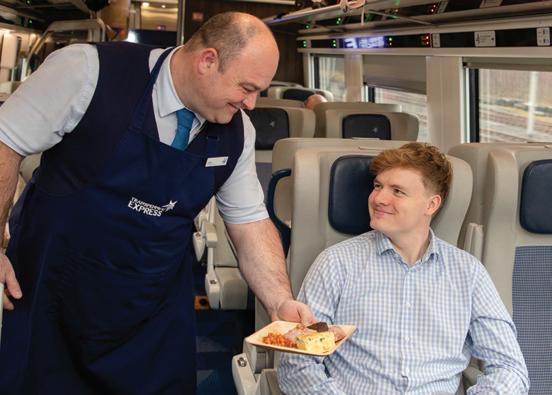
FIRST CLASS TREATS ON TPE
Train operator TransPennine Express is spicing up its service with a new First Class menu for passengers travelling on cross-border services between

audit manager at Great Western Railway, the book stars her real-life rescue dogs Rupee and Sushi and invites readers to choose their own adventure, covering everything from planning the trip and purchasing
tickets to boarding the train.
Carys shared her inspiration: “I’ve always enjoyed writing and poetry and was inspired to write the book after attending one of the ‘Try a Train’ sessions GWR puts on to give people more confidence traveling on the railway. Rupee is already well known across the network as an accessibility volunteer and she’s really good around people who are nervous. She’s a bit of a distraction and loves to be made a fuss of.”
The book, illustrated by Donna Nicholson, is a team effort supported by the Severnside Community Rail Partnership and the Conwy Valley and North Wales Coast Community Rail Partnership.
Hip and happening interchange vibes!
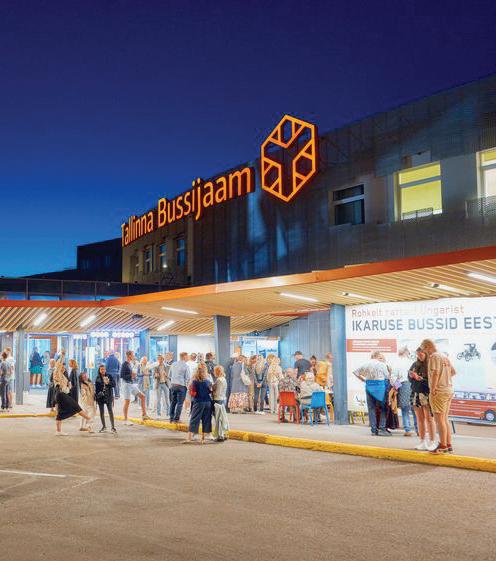
PARTYING AT THE BUS STATION
Estonia, already hailed as a hip and trendy destination, recently cranked up its cool factor when DJs Ennu Ratas threw a club night at Tallinn’s main bus station.
the North West of England and Scotland. The fresh offering, dubbed West Coast Kitchen, features delicious dishes and snacks inspired by the train operator’s network, covering routes between Manchester, Liverpool, Lancashire, Cumbria, and Scotland.
Start your journey with a hearty Scottish Highland breakfast, featuring traditional Lorne sausage and The Farmer’s Son black pudding, perfect for kicking off your travels with a taste of Scotland. If you’re in the mood for
something more substantial later in the day, dig into a comforting braised beef stew, rich and satisfying, or creamy macaroni cheese made with the smoky, indulgent flavor of Belhaven smoked cheddar. Still peckish? No problem. Grab a delicious sausage or vegan sausage roll baked by Pie Demand (geddit?) in Carlisle.
“We have worked hard to improve our catering, particularly in First Class,” said Kathryn O’Brien, TPE’s customer experience and transformation director.
“For one electrifying night, the bus station transforms into a bustling dance floor,” exclaimed the facility’s website. The party kicked off at 8:30pm and didn’t stop until the wee hours. But it wasn’t just about the beats - this bash was all about giving back. The event raised funds for the Tartu University Hospital Children’s Foundation. And as if that wasn’t cool enough, attendees also enjoyed retro bus rides around town!
SEEN SOMETHING QUIRKY? Why not drop us a line at editorial@passengertransport.co.uk
SUBSCRIPTION ORDER FORM All annual subscription rates include delivery by secondclass post, or airmail for overseas. ANNUA L SUBSCRIPTION R ATES 1 year UK: £140 EU & Rest of World: £280 2 year UK: £250 3 year UK: £375 WWW.PASSENGERTRANSPORT.CO.UK N A M E JOB TITLE CO M PANY ADDRESS POSTCODE TEL E M AIL DATE PLEASE START MY SUBSCRIPTION TO PASSENGER TRANSPORT CARD NU M BER SECURITY CODE EXPIRY DATE SIGNATURE I enclose a cheque for £ made payable to Passenger Transport Publishing Limited Please invoice my company (official order enclosed) I authorise you to debit my M astercard/VISA/ M aestro/VISA Electron card. Amount £ PT314 Email: subs@passengertransport.co.uk Return to: Subscriptions, Passenger Transport Publishing Ltd, PO Box 5496, Westbury BA13 9BX
Carys and Rupee
Food, glorious food!
28 | 31 May 2024 www.passengertransport.co.uk



 Robert Jack Managing Editor
Robert Jack Managing Editor






























